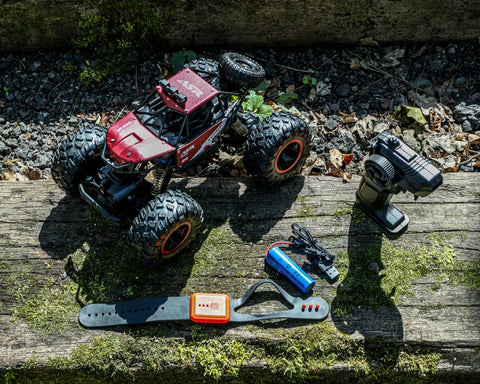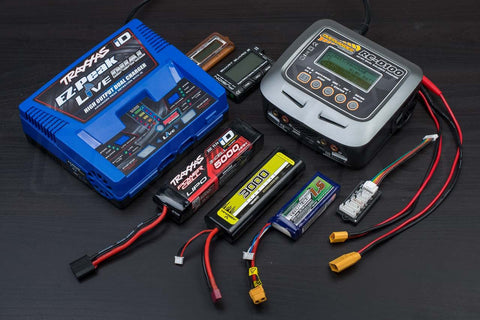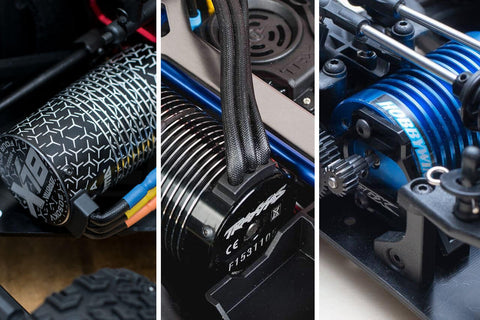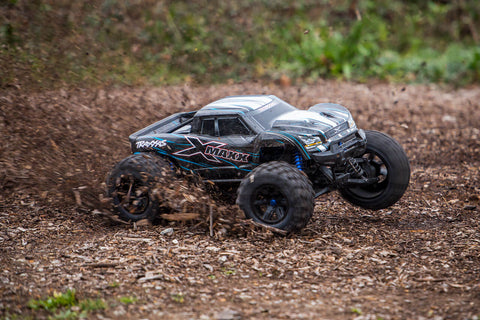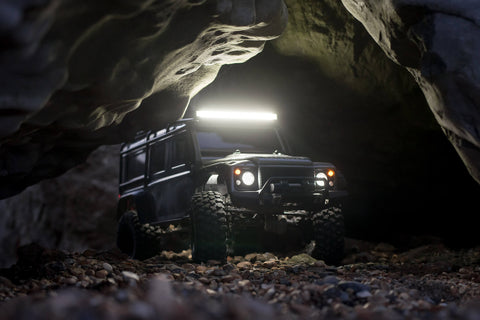Ready-to-run drift chassis can be a little hit and miss, but not everyone has the time, experience or money to build a complex custom drift kit up. Thankfully manufacturers still offer tried and tested touring chassis with a drift 'spin' for beginners. We take a look at the latest such release from HPI Racing, the E10 Drift Fail Crew Nissan Skyline (R34) GT-R.
HPI Racing's E10 at a glance
- Factory built, ready to run E10 drift car chassis
- Official replica body of the Fail Crew Nissan Skyline R34 GT-R
- Waterproof Speed Controller
- 2.4 GHz TF-41 Radio system with batteries included
- 7.2v 2000 mAh NiMH battery
- AC wall charger with worldwide adaptors
- Shaft drive 4WD system
- High torque Saturn 27T 540 motor
- Low offset wheels with hub spacers and Toyo branded tyres
- 375mm long, 198mm wide weighing 1280g without a battery
Unboxing the drift car
Included with the car is the transmitter, 4xAA batteries to power it, a NiMH model battery, a 'trickle' type battery charger, stickers, warranty card, manual, some various spares plus an allen driver.
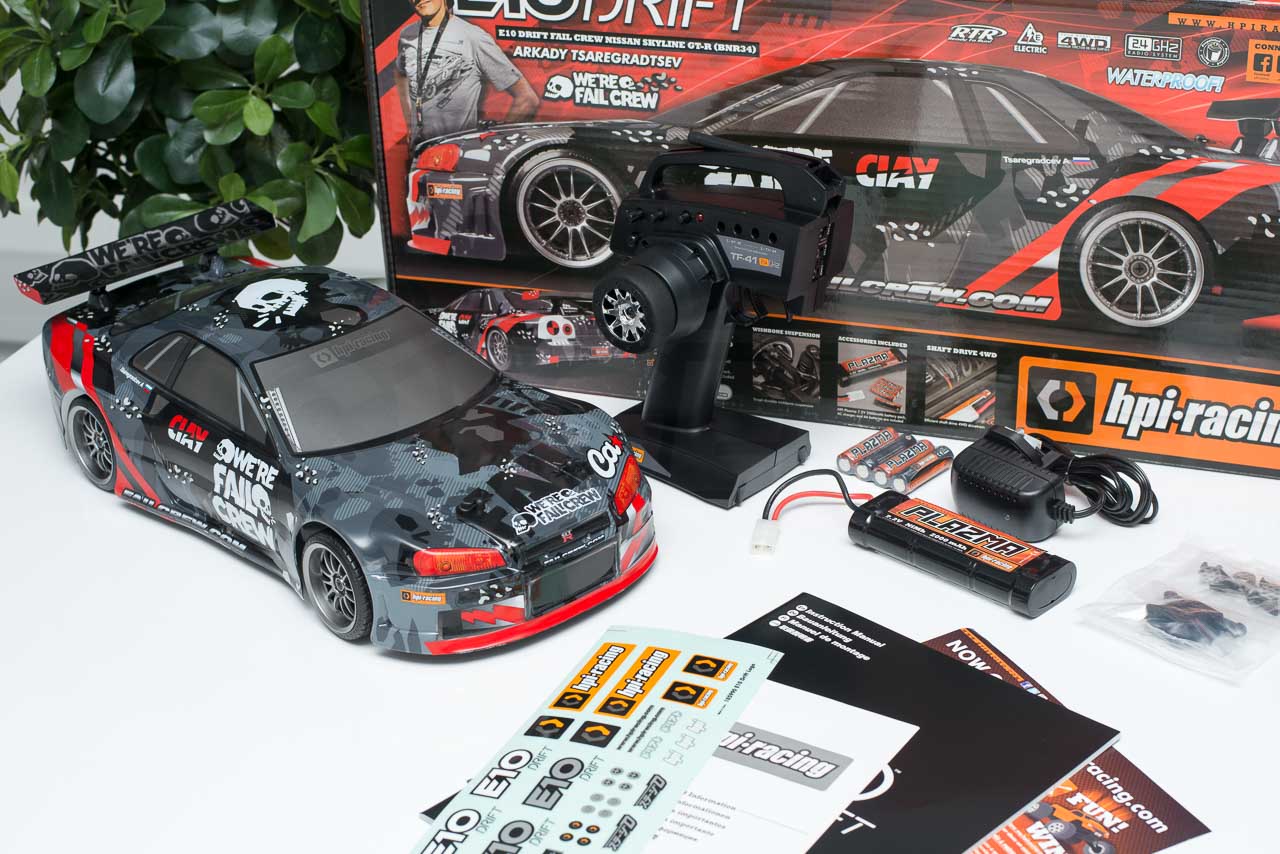
Manufacturers are playing quite fast and loose with the term 'ready to run' so it is great to see HPI Racing providing a true RTR set that has literally everything you need to get drifting!
Batteries included
The included battery is a 7.2v, 6 cell, 2000mAh capacity NiMH fitted with a 'Tamiya' connector. Its a simple lightweight, robust cell that is worth £17.50 on its own.
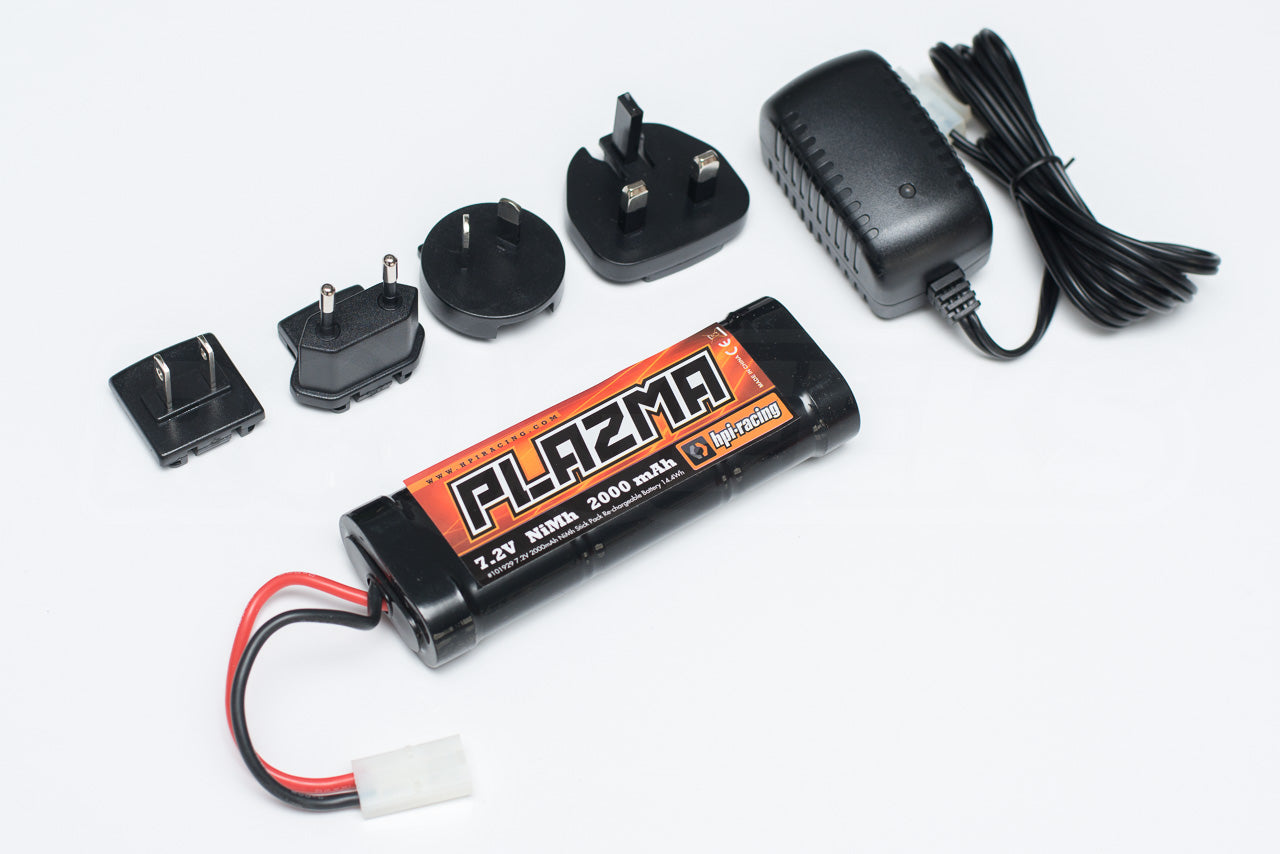 |
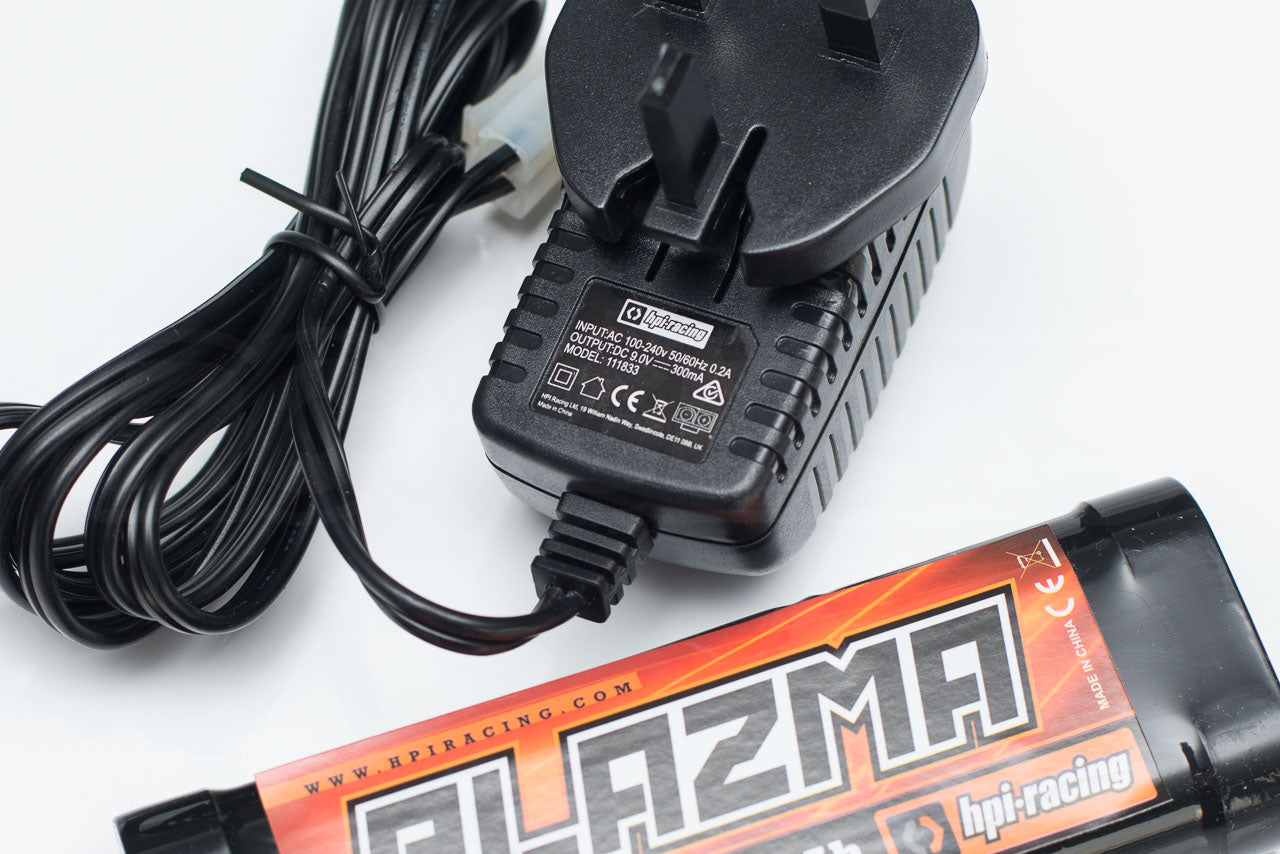 |
HPI Racing include a 'worldwide' charger with four adaptors that should cover all the plugs you ever need to insert it into. A basic charger (worth £12) it will take a little under 7 hours to charge the battery from flat (with the light illuminated green whilst in progress) and is more commonly referred to a trickle charger. We'd suggest buying another couple of batteries and perhaps a faster charger to increase your runtime and shorten downtime.
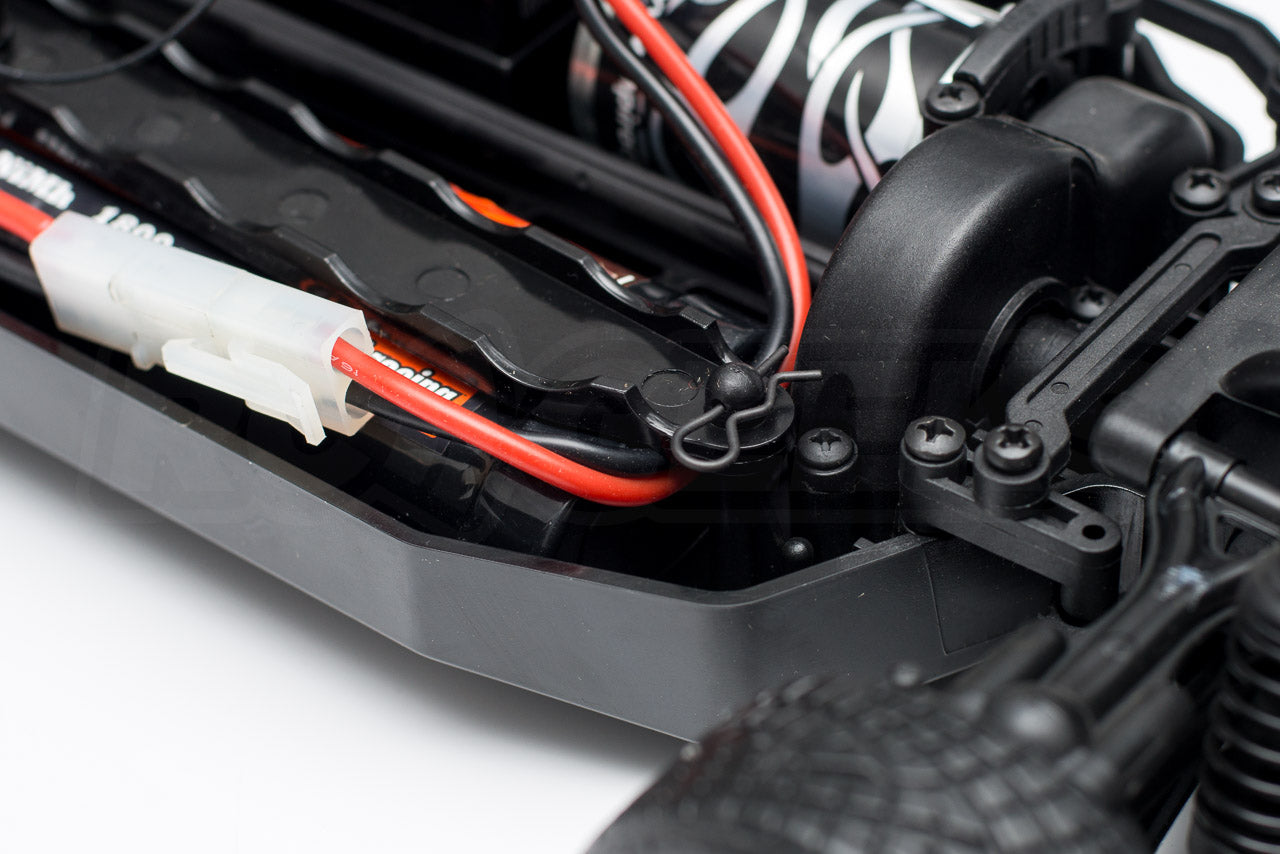
With the relatively short battery securing strap (held down with two body clips) you will likely be restricted to stick pack style batteries, thankfully we do sell a 4400mAh battery from Overlander that will have you drifting long after the included battery is dead.
Proven drift chassis
The E10 has been around for over a decade with some small evolutionary tweaks over its lifespan. Tried and tested, it is a flexible design based around a 4WD shaft-driven powertrain and bellcrank style steering system.
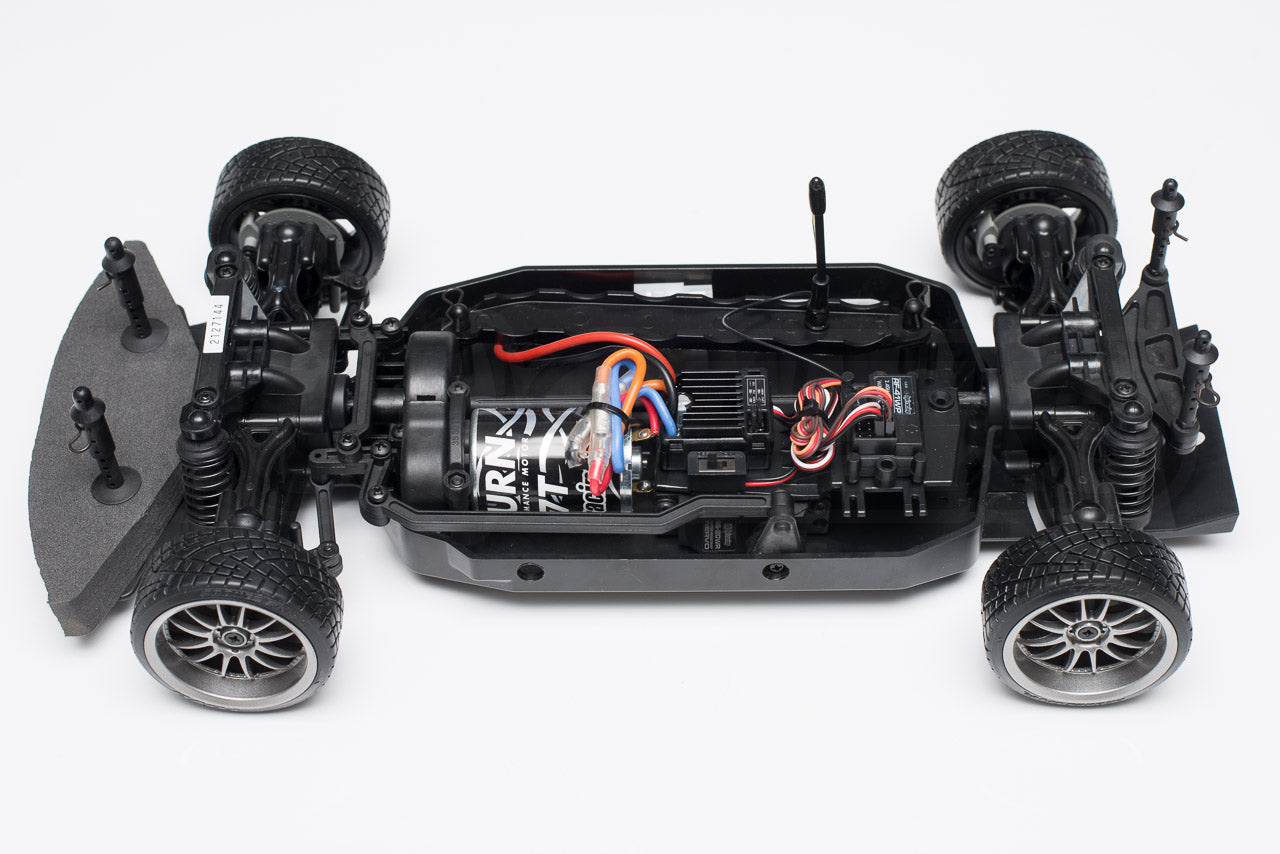
A flexible design, the motor/esc/receiver can be flipped round to place the motor at the rear of the tub (without any extra components) adjusting the weight balance to suit a grip racing instead.
Brushed ESC and Motor
Mounted on top of the steering servo, HPI's SC-3s WP2 waterproof electronic speed controller is a 60A brushed unit weighing just 39g. Mounted to the side is the model power switch, accessible without removing the body by slipping your hand up the side, just be careful of the steering linkage moving to the centre position when it fires up!
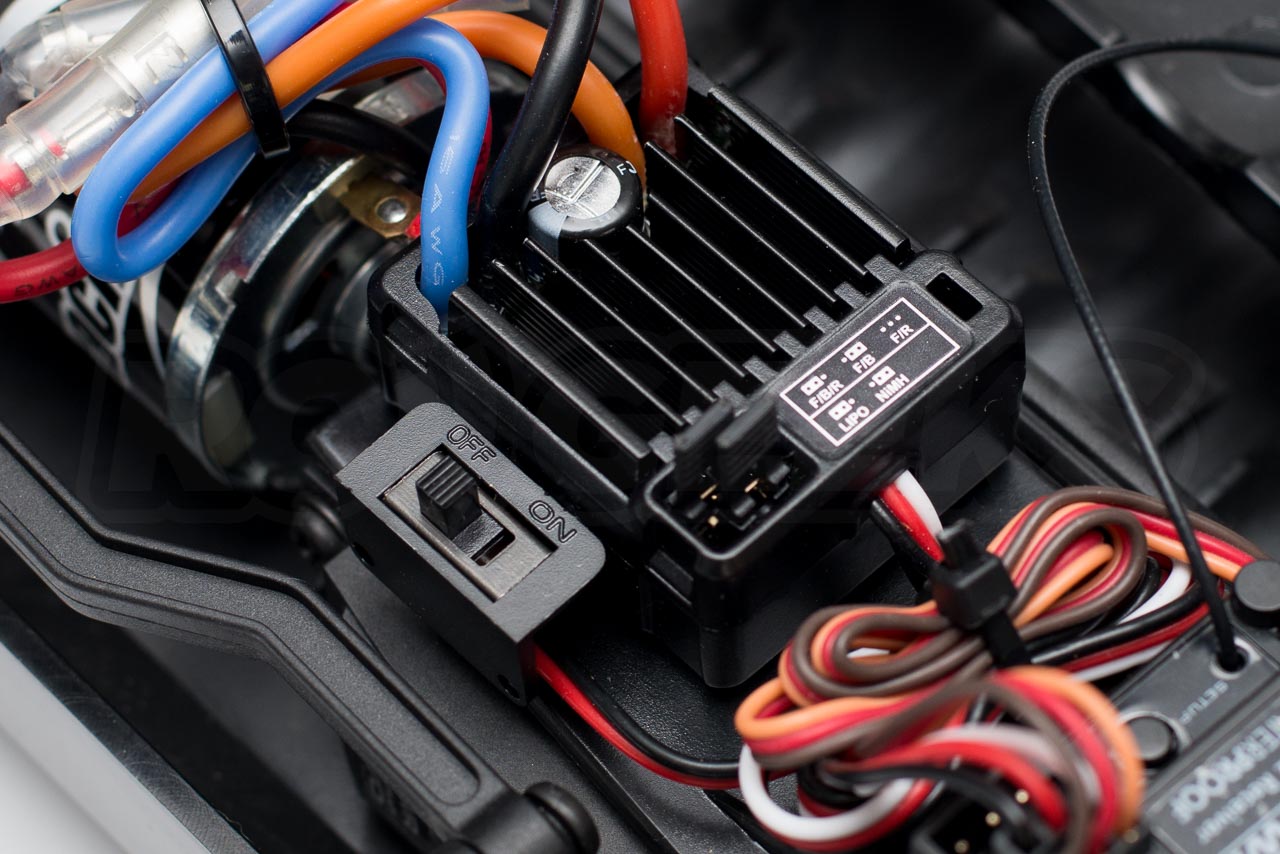
It will accept 5-9 cell NiMH or NiCD batteries or 2-3S LiPo batteries (with a low voltage cutoff). Should you find a 3S cell with a Tamiya connector, just make sure you move that outer jumper over to the left before plugging a LiPo in. The inner jumper controls the brake/reverse configuration, allowing you to disable the reverse function for racing.
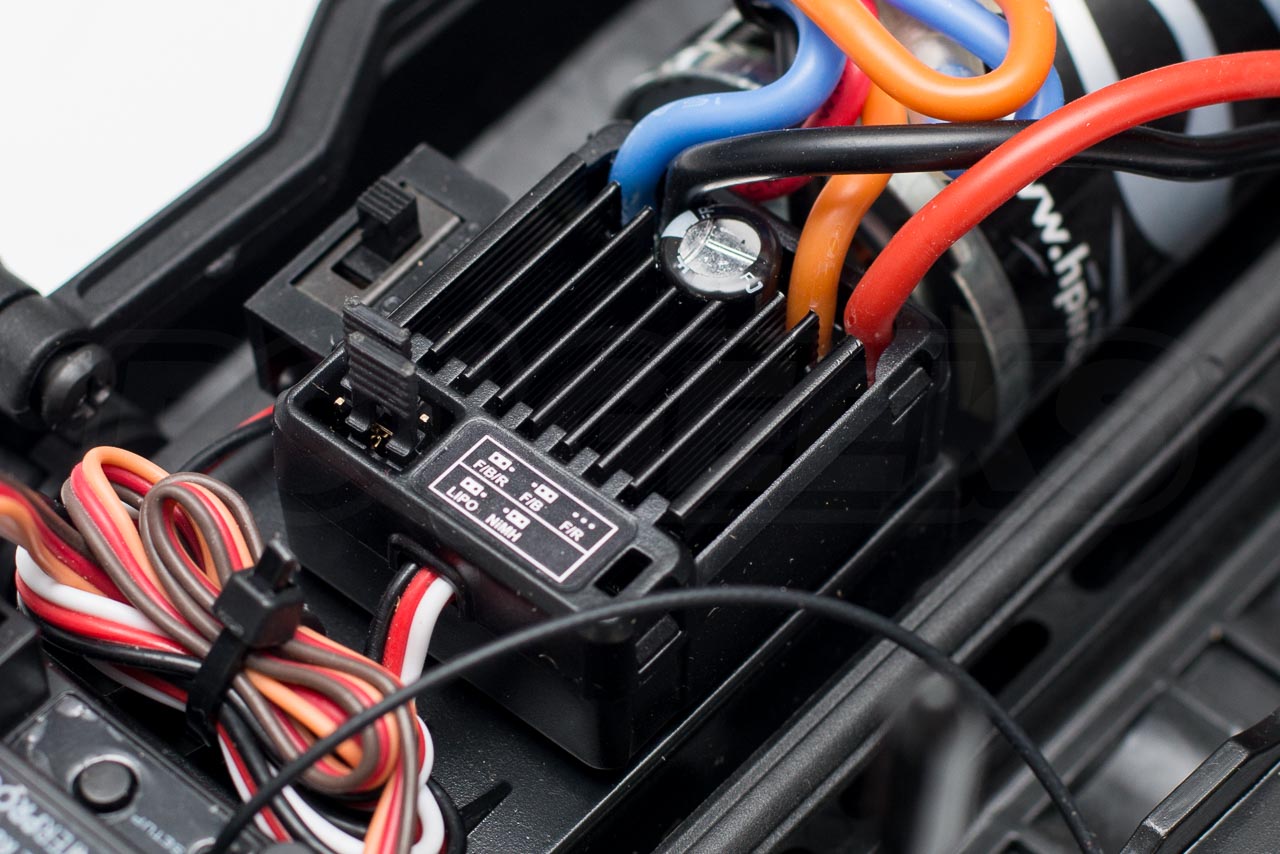
Hooked up to the ESC via bullet connectors is HPI's 'high torque' 27T motor. Standard 540 sized, it is a reliable unit that can be swapped out with ease.
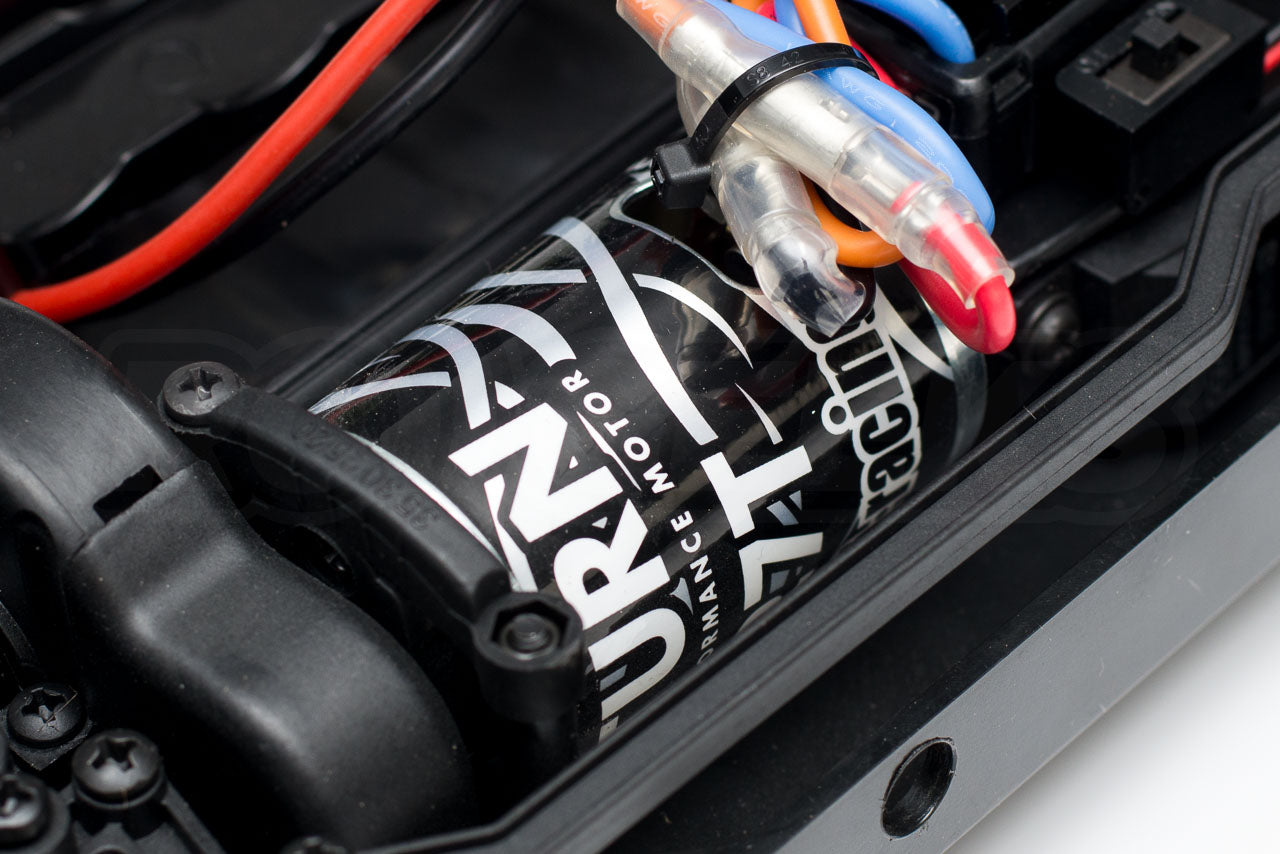
The motor is fitted to a plastic motor mount that rotates in a frame to adjust the motor mesh between the metal pinion and the plastic spur. The meshing can be checked easily by flicking the cover off with a small flat-head screwdriver.
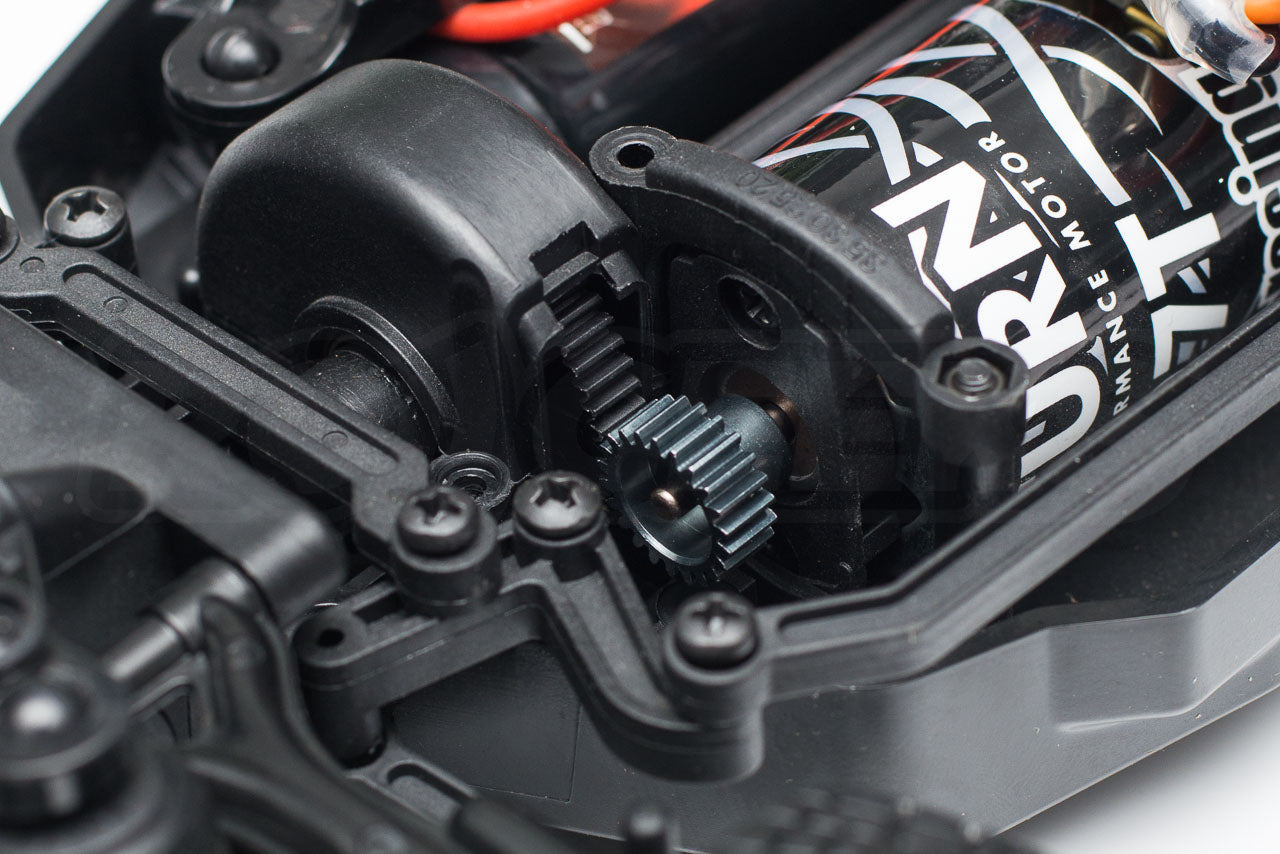
The gearing and differentials are covered to protect them against debris with only the propshaft and driveshafts exposed.
Complex bellcrank steering system
The steering system on the E10 features many linkages but does so with minimal slack. Mid-mounted on its side under the ESC, the SS-20WR servo is a 6.5kg plastic-geared water resistant unit weighing just 42g.

A long linkage bar hooks links the horn to the bellcrank setup mounted behind the front diff. The track rods link out to the long hubs allowing for maximum steering angle. The linkage system takes the brunt out of an impact, so your servo should last a little longer.
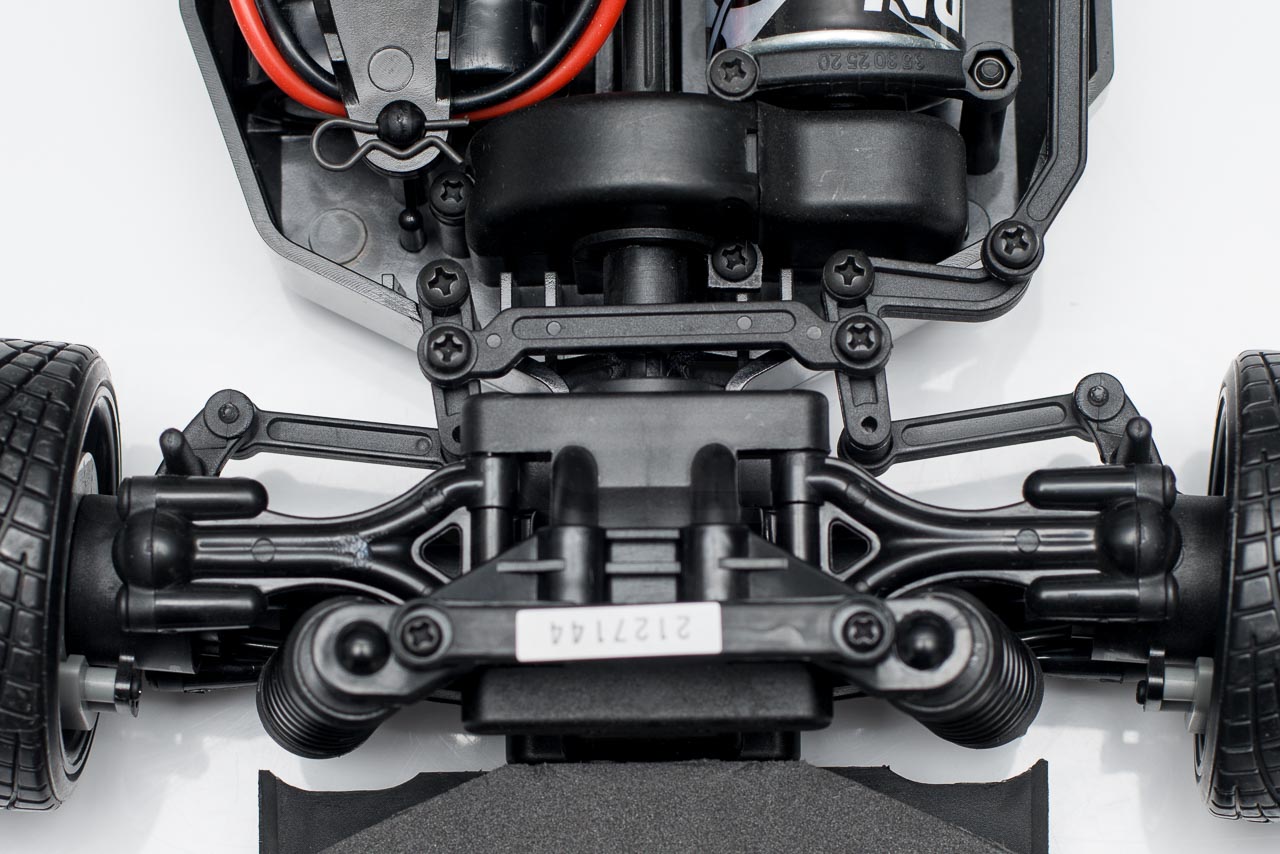 |
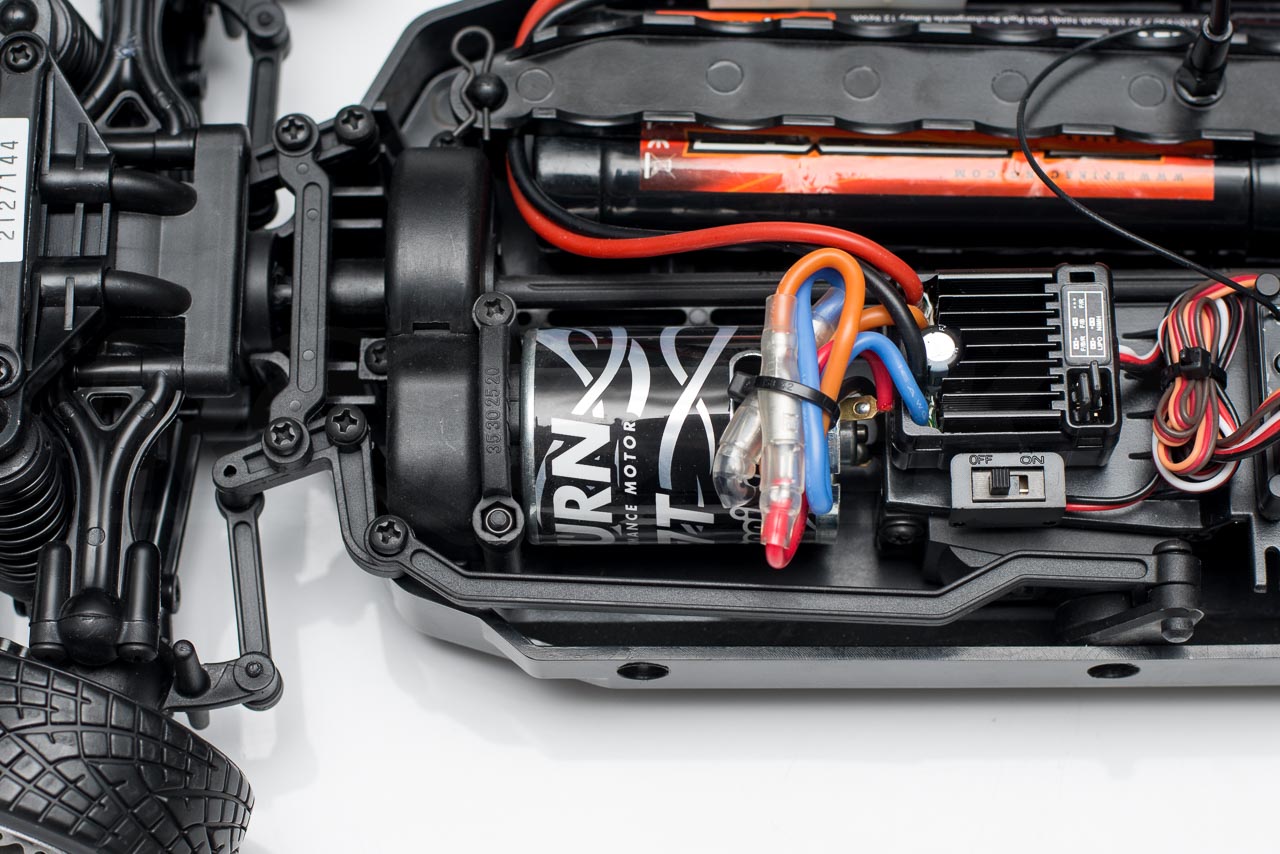
|
Whilst greater than standard touring chassis, the E10 lacks the insane steering angle of 3Racing's Sakura purpose-designed drift chassis.
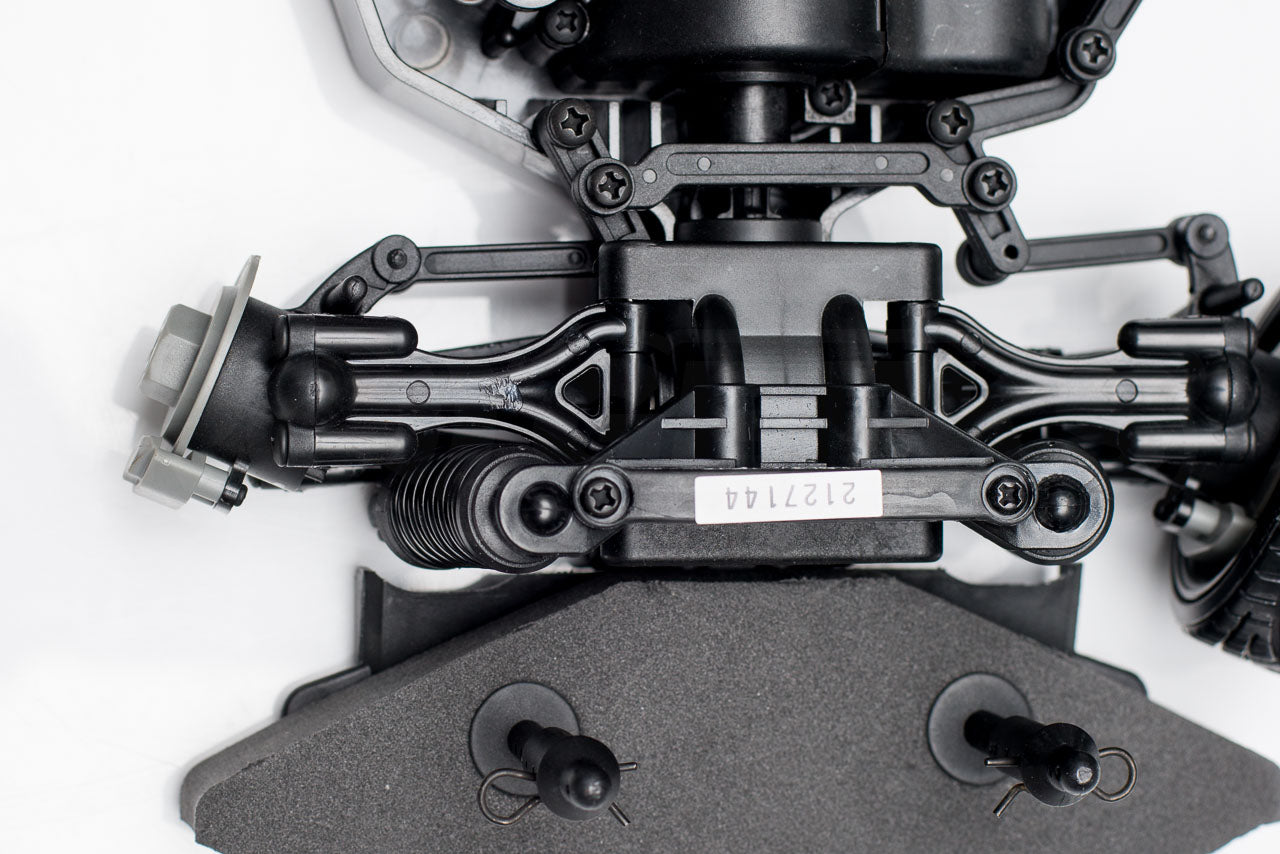
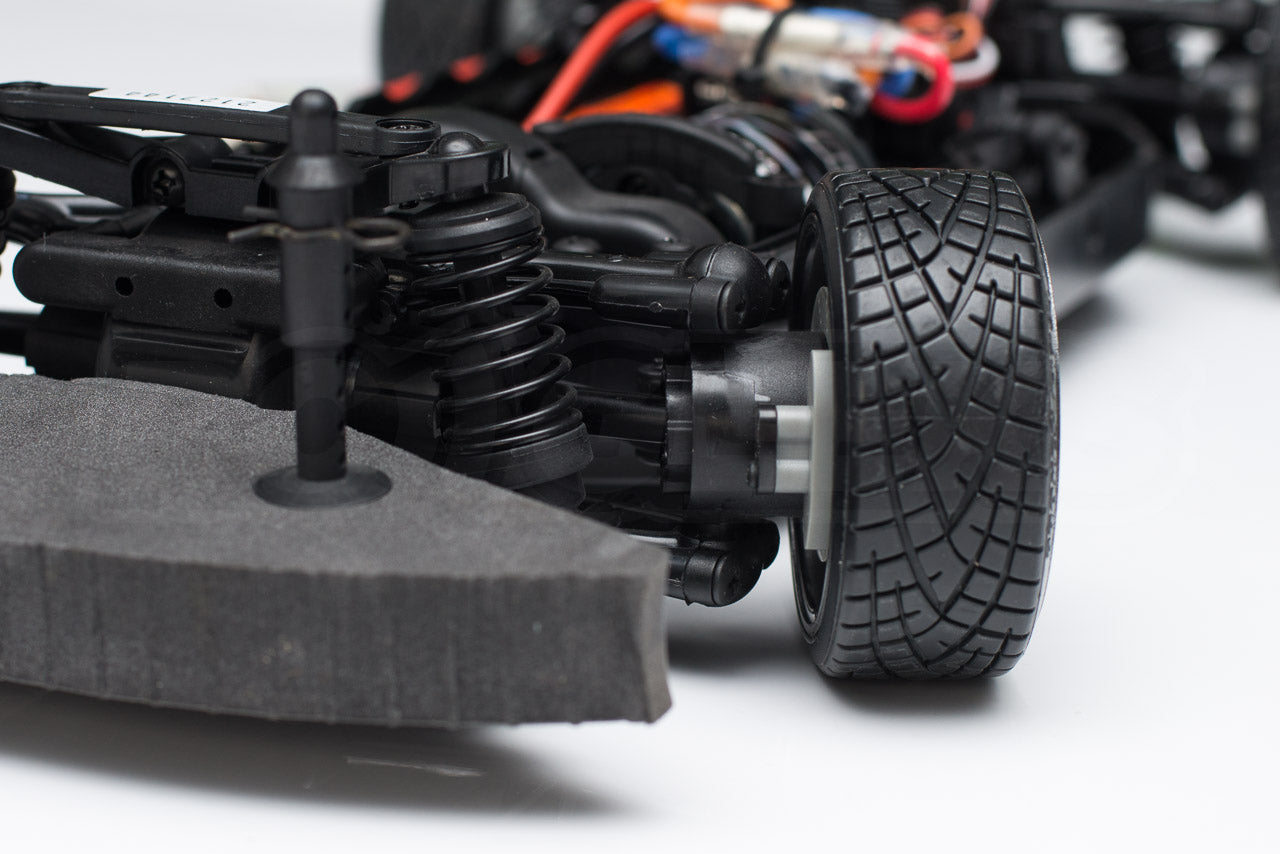 |
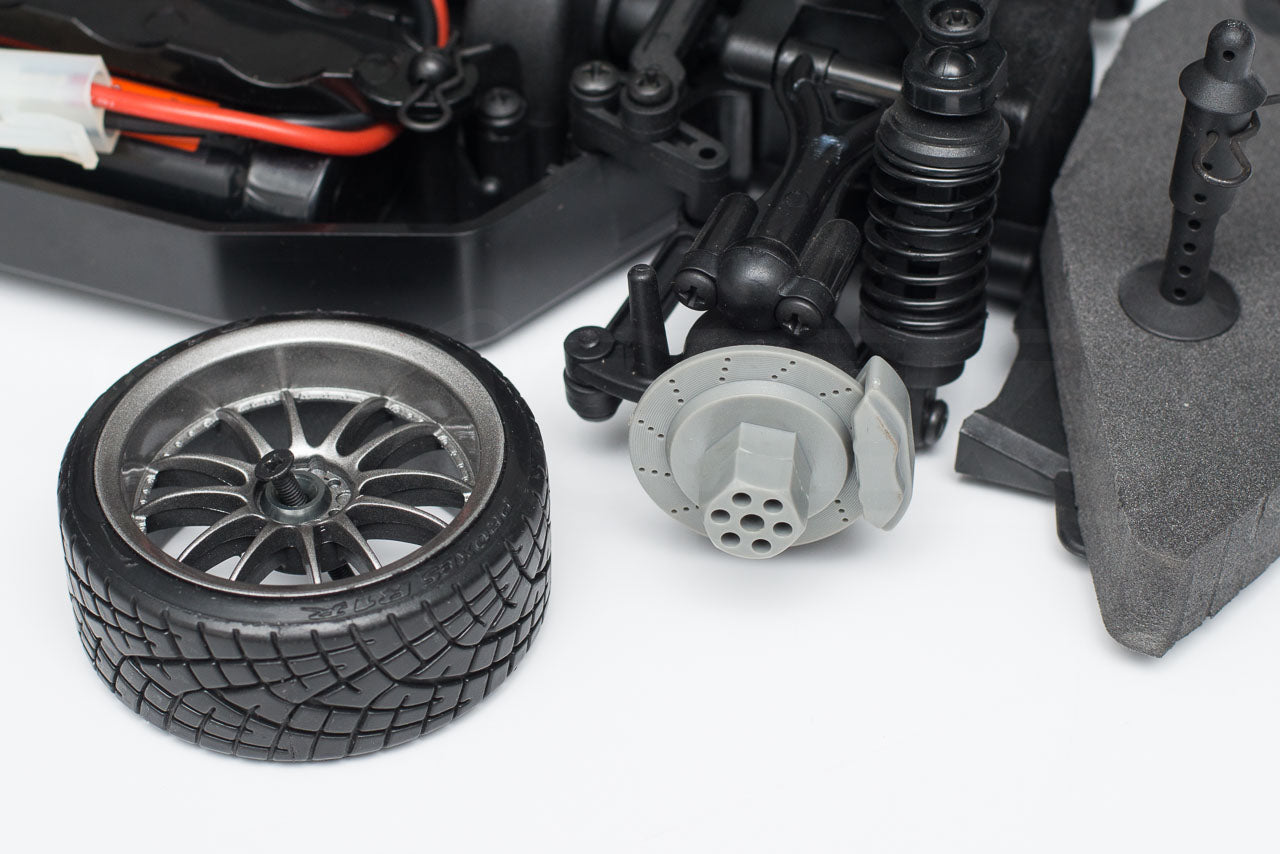 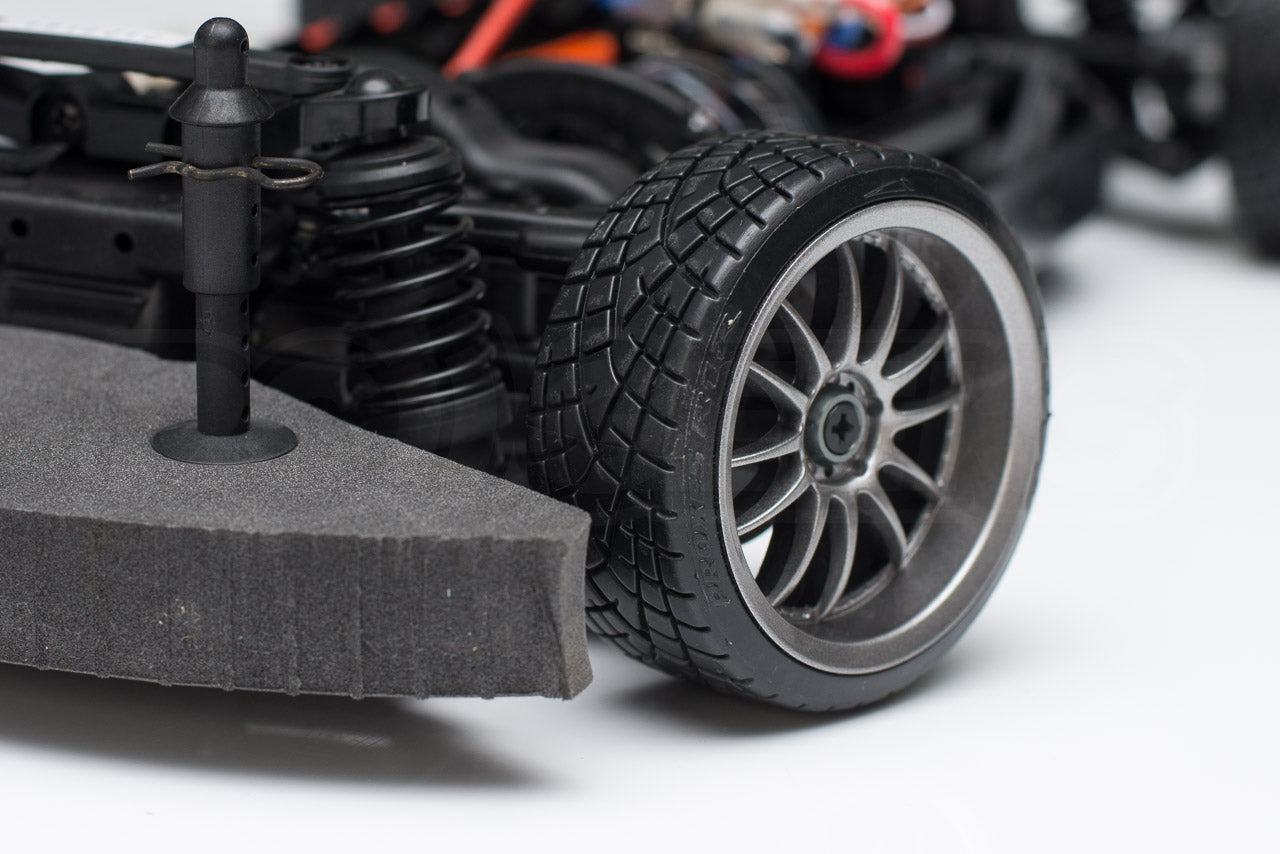
|
Dished wheels and drift tyres
Our favourite addition in this Fail-crew special release are these deep dish hyper-silver painted multi spoke wheels. A square setup, they are wrapped in Toyo branded Proxy R1R look hard-plastic drift tyres. These are licensed with the genuine branding and a tread that replicates the real thing.
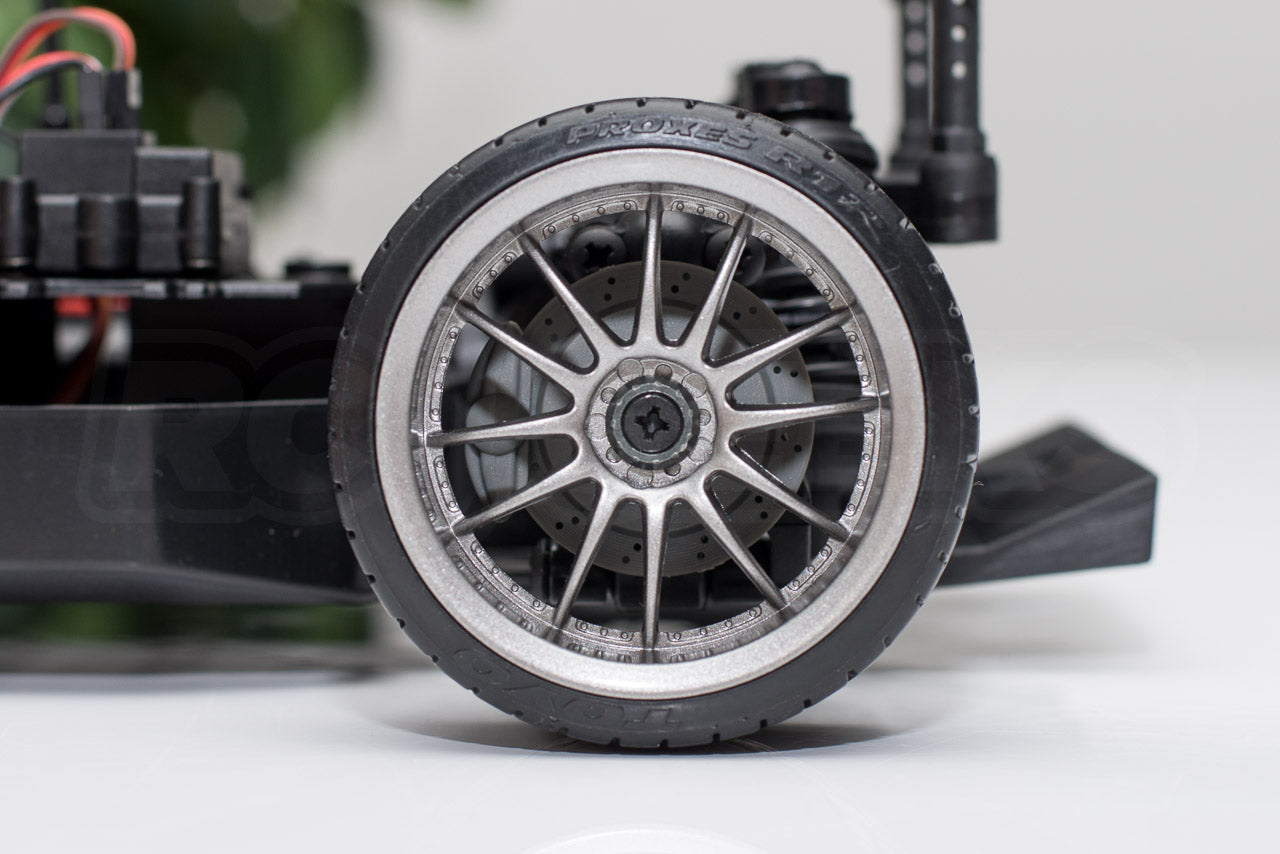
|
The chassis hubs have a drilled 'floating-hub' disc design with brake caliper. Arriving unpainted they would look even better with some paint and perhaps even some decals on the large front calipers. For a budget RTR kit they really bring a scale realism to the whole package.
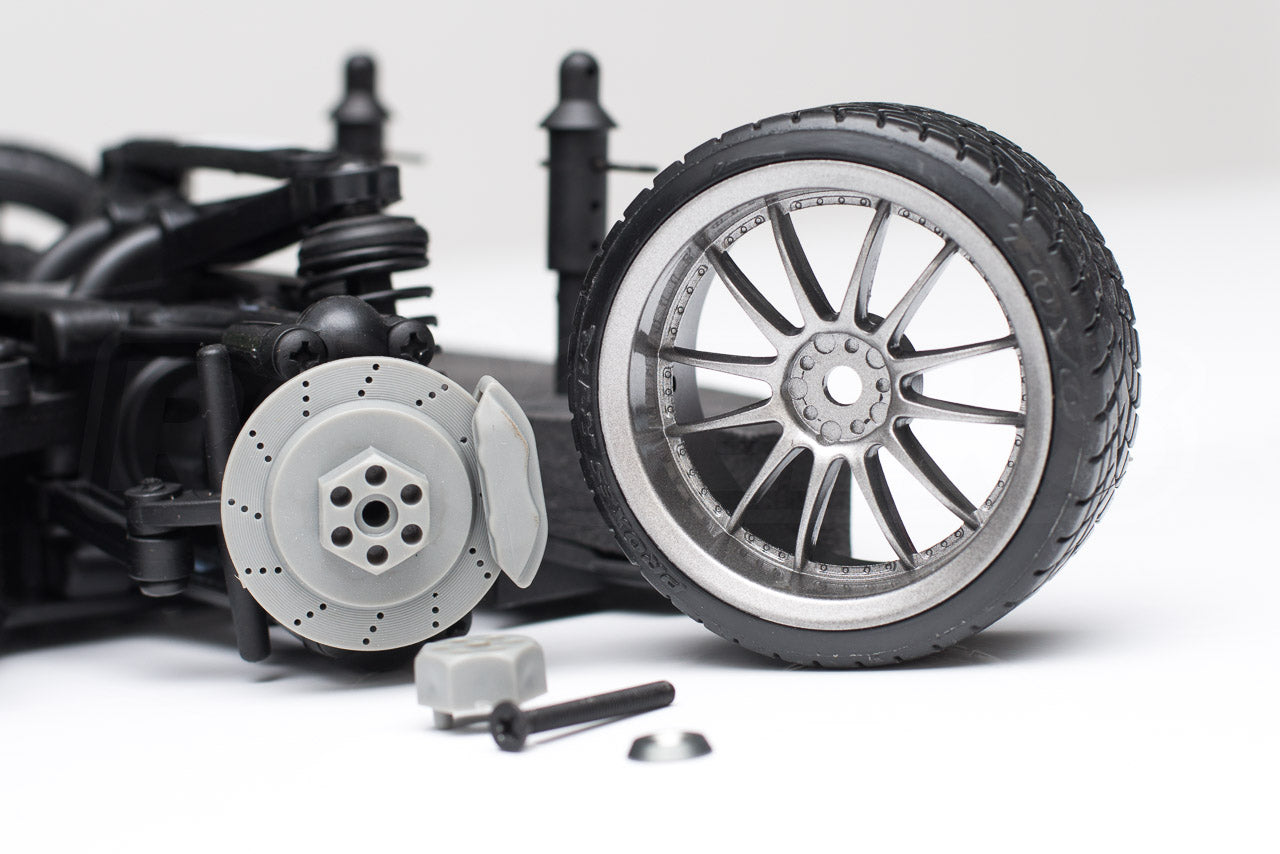
Instead of wheel nuts HPI include a long cross head bolt and metal cone washer to hold the wheels onto the threaded wheel hubs with optional wheel spacer blocks that lock into the original disc and increase the track another few millimetres.
Suspension
The E10 features an 'extra-long' (but non adjustable) double wishbone design. The dampers are basic spring units sat through hard plastic suspension towers.
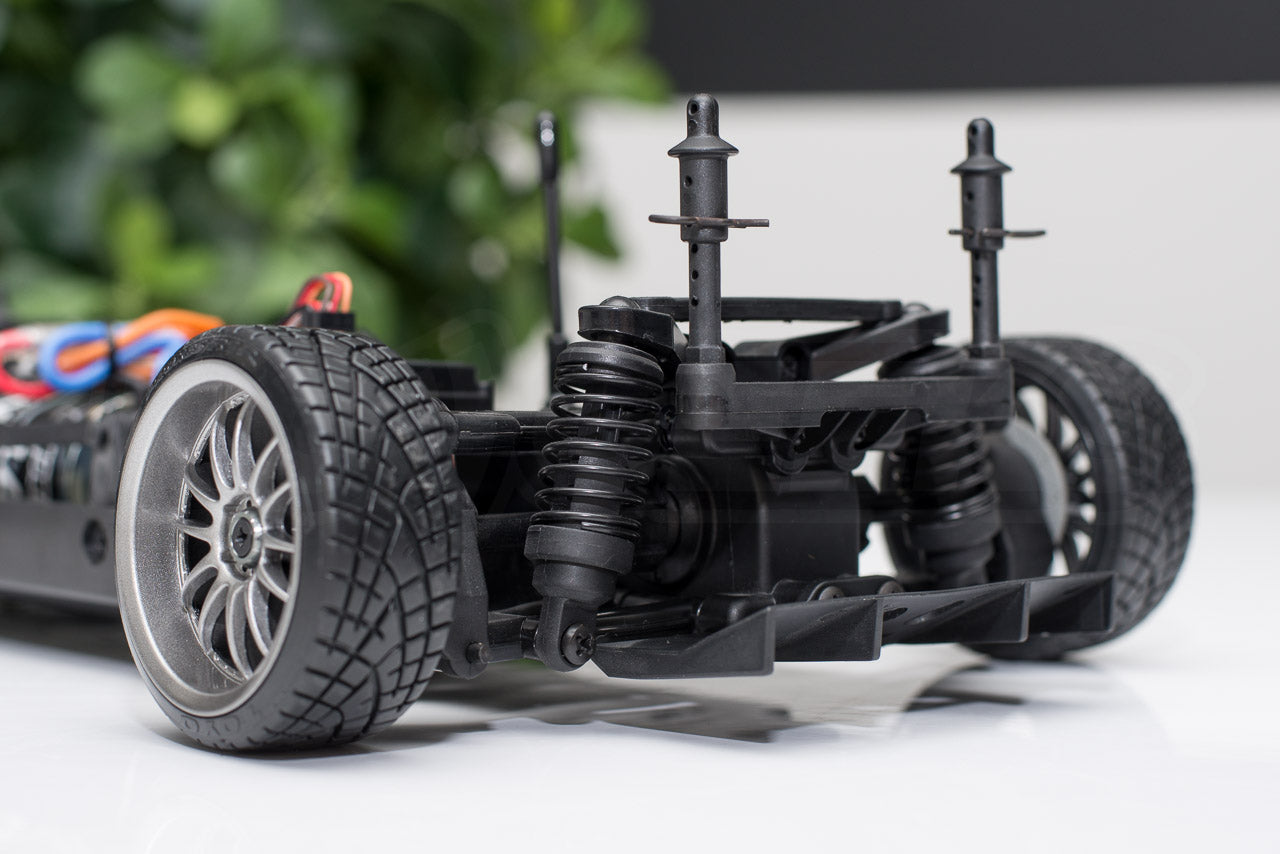
Its here where the R34 shows it's budget roots, as nearly ever other model at this price point comes with oil filled dampers. However, this a lightweight chassis that will be used on smooth surfaces, a basic setup as such should work ok.
Chassis plate
Built off of a single plastic chassis plate, the E10 is drilled to accept a rotation of the motor and electronics to switch it to a mid-rear motor layout that HPI state is more suited to grip racing.
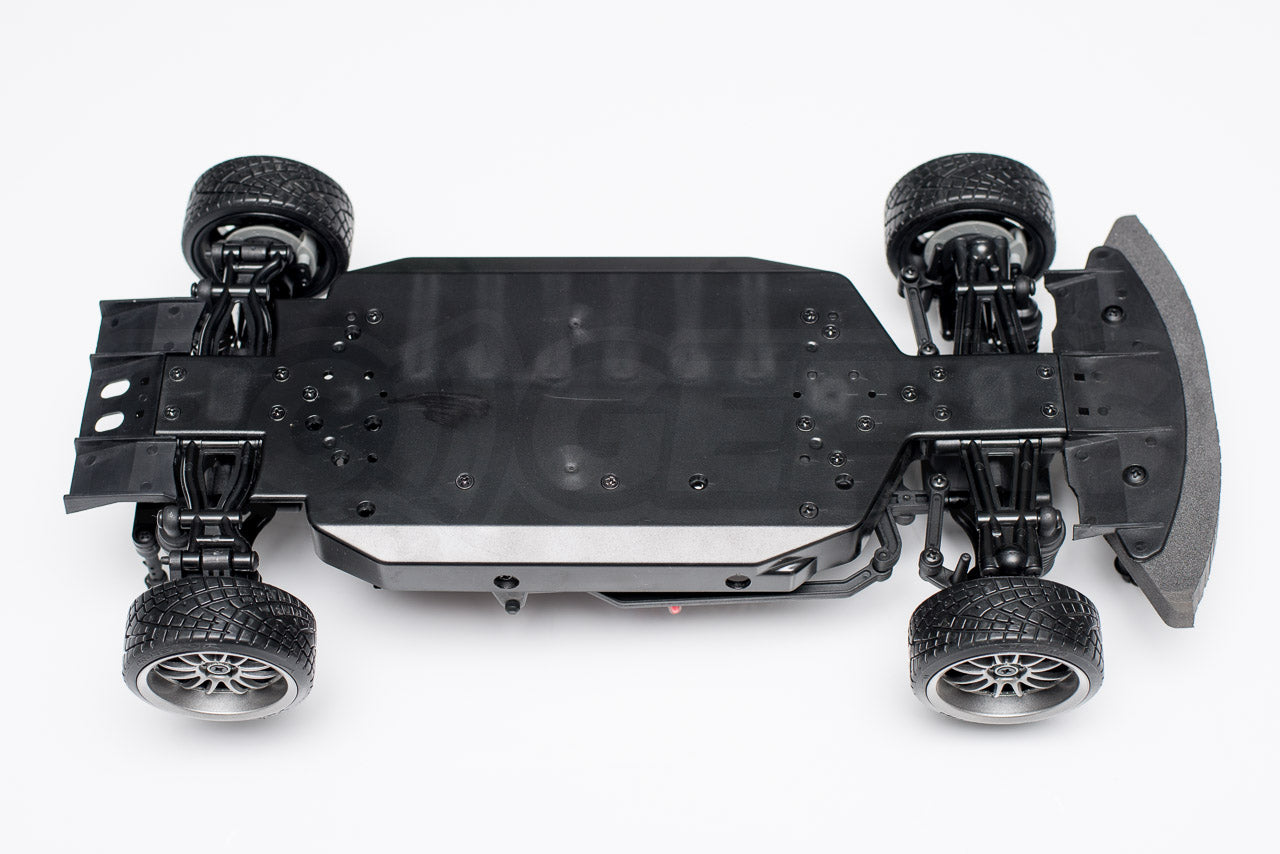
 |
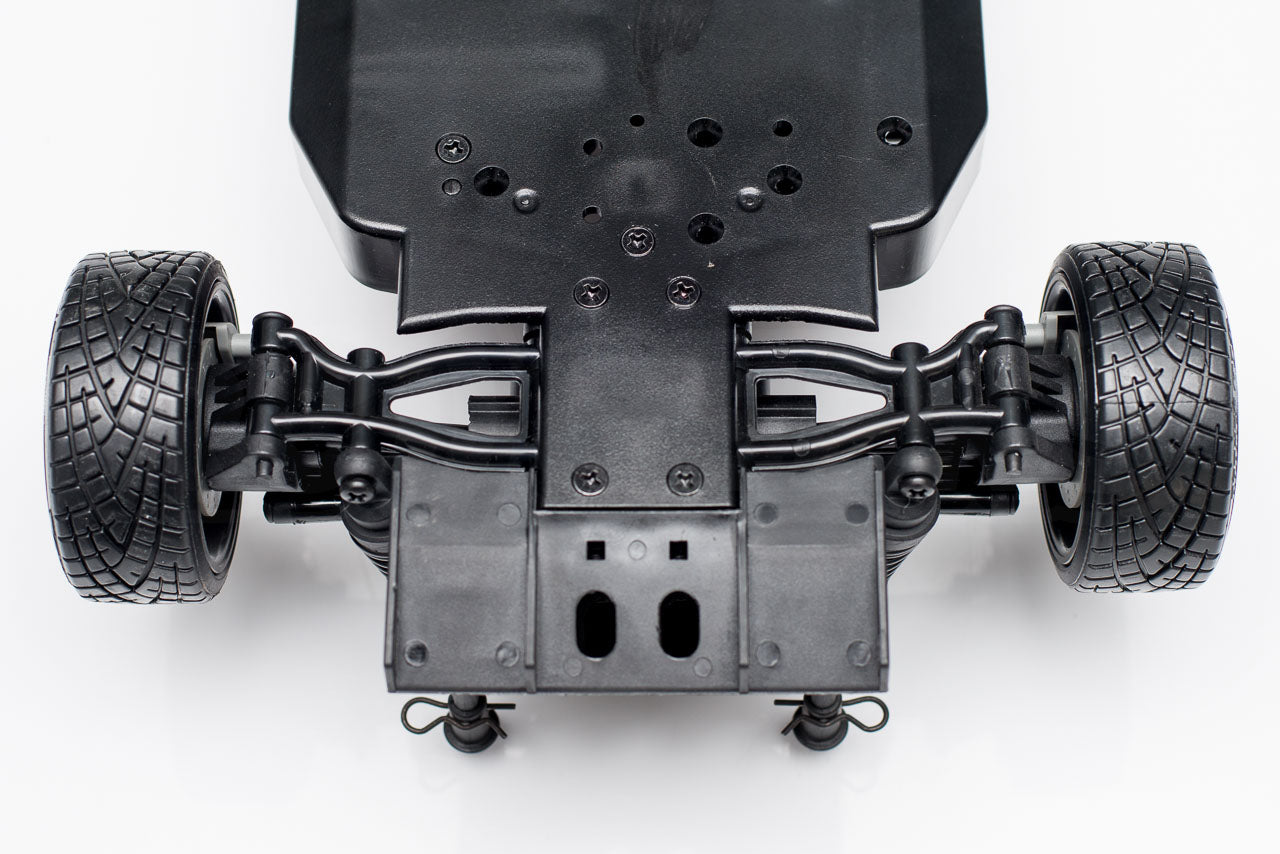 |
A large plastic platform with foam bumper mounted to the chassis plate by the front diff, whilst at the rear a large plastic finned diffuser kicks up from the plate.
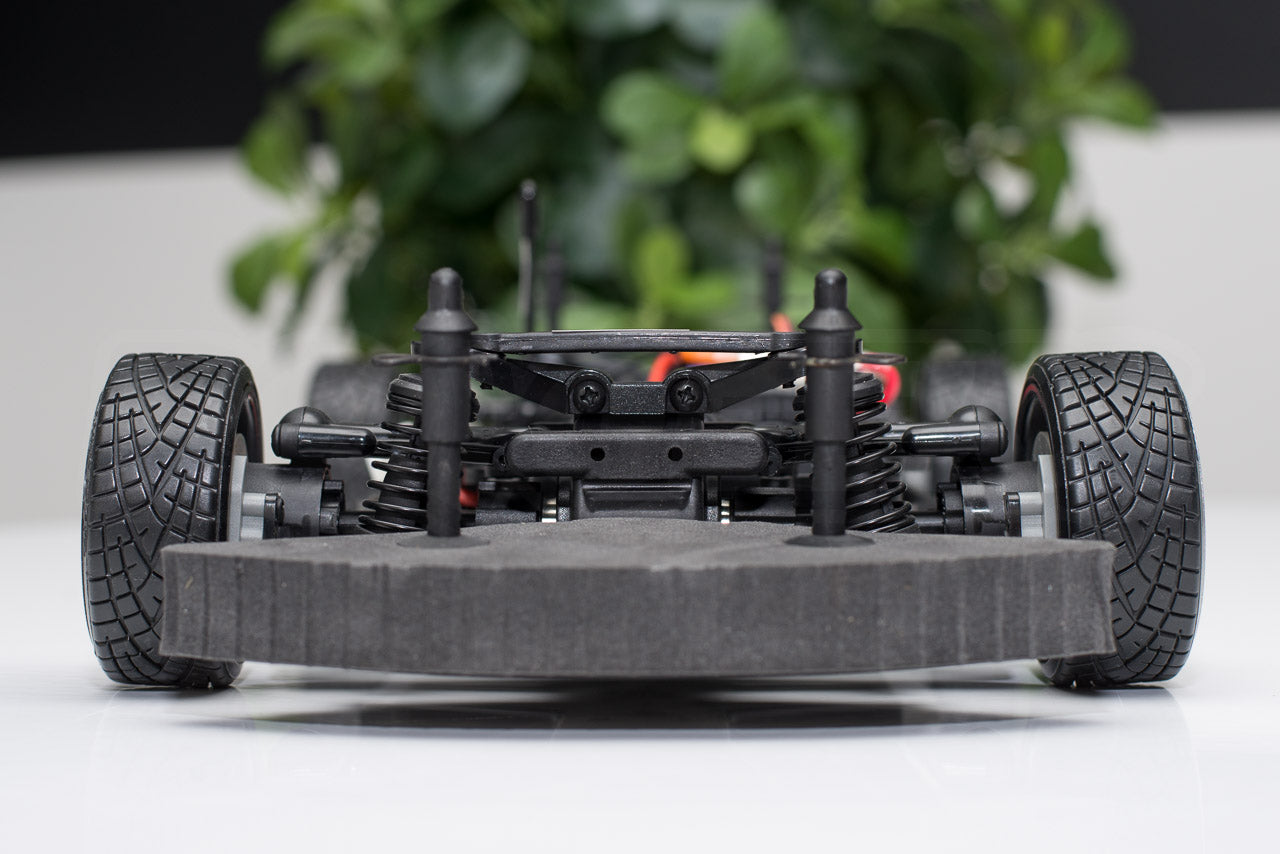 |
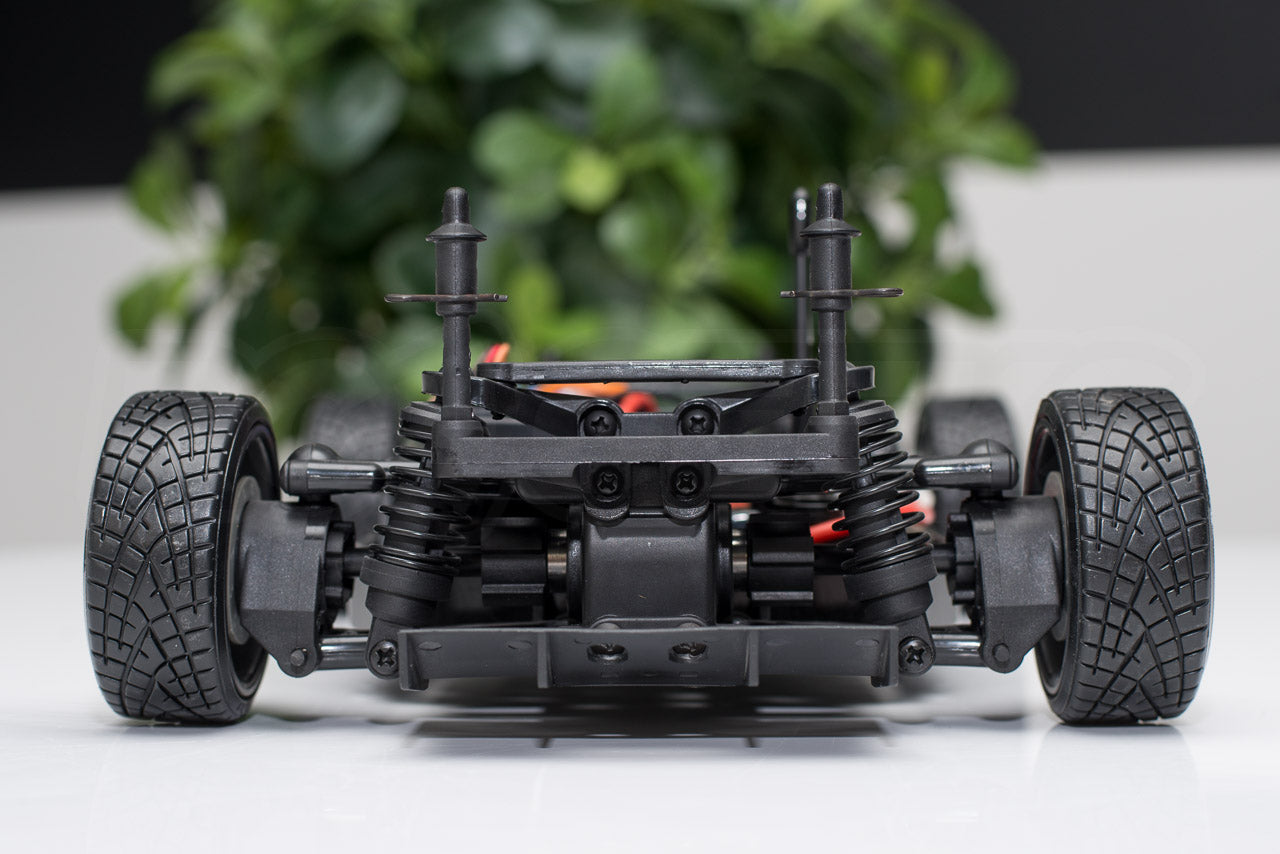 |
From the end you can see the amount of (non adjustable) camber the chassis runs as standard, with the outer edges of the tyres off of the ground at rest.
2.4 GHz Radio system
HPI have bundled the TF-41 transmitter with the E10. Despite its bulky looks it is good to hold, balanced in the hand with a soft-touch foam steering wheel spaced out from the body. As with most controllers of this style, the batteries are held under a sliding cover in the base.
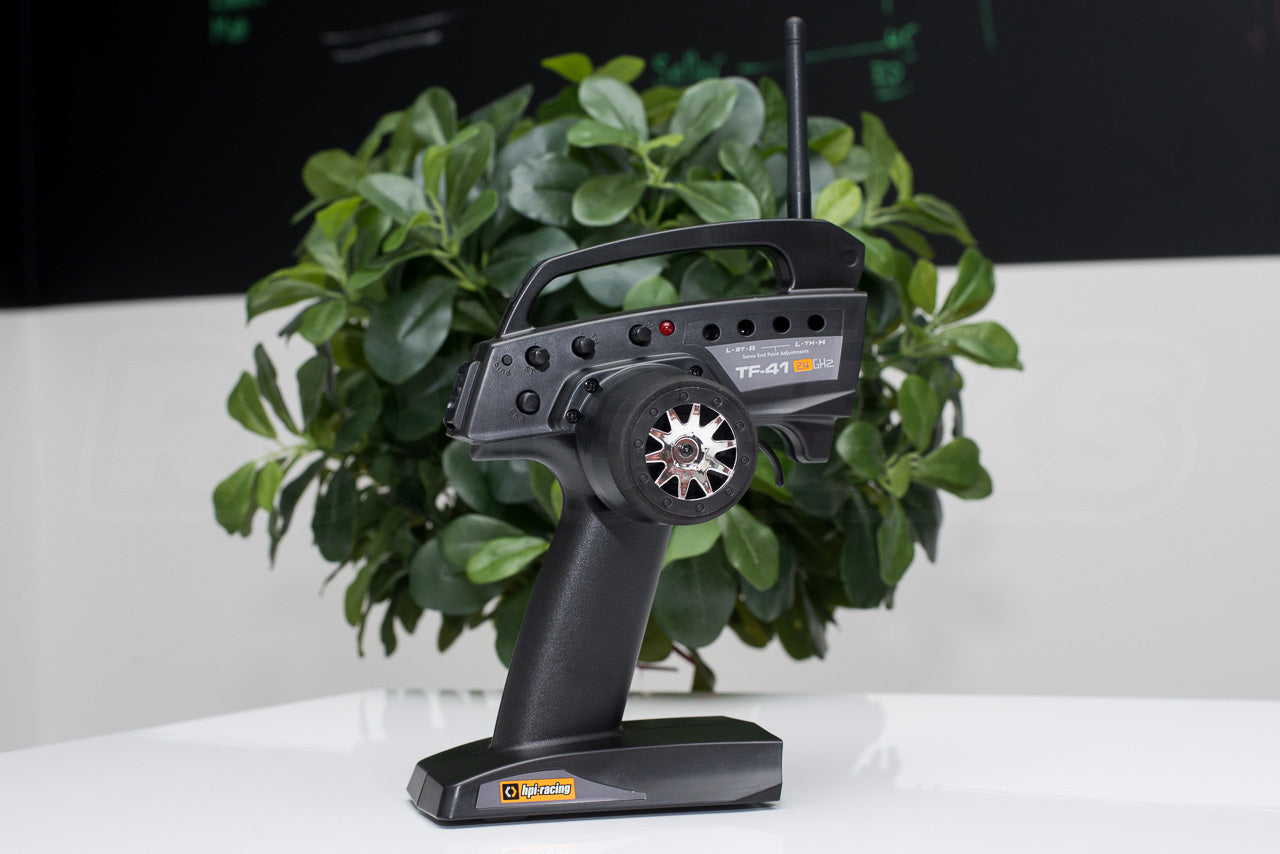
There are a plethora of adjustments spread across the stick controller. At the rear is a large power button, run down the side are steering trims and dual rates, end points can be adjusted for both channels via the sunken pots and lastly channel reverse switches can be found on the front. Wondering what all this means? Check our guide here. We love that it has a folding antenna and a large carry handle stretching across the top.
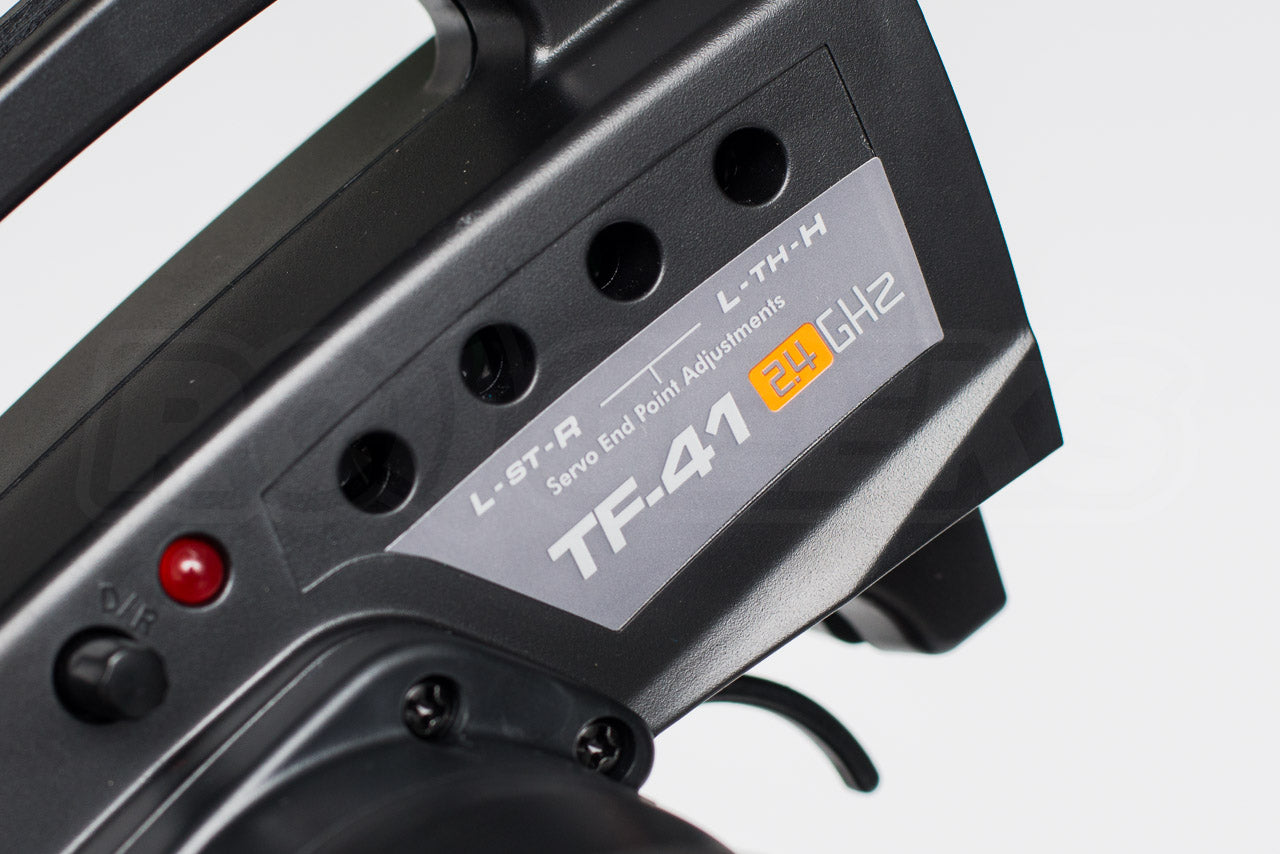 |
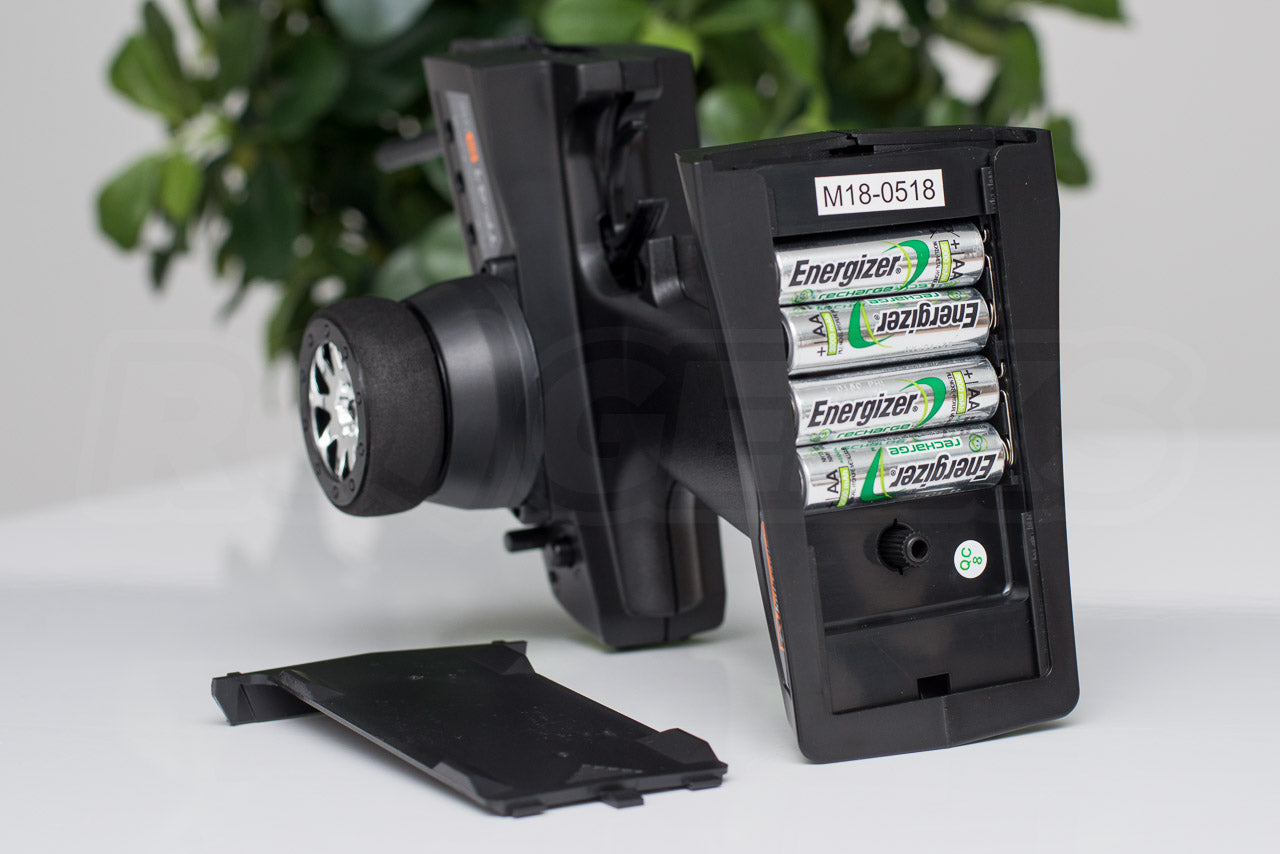 |
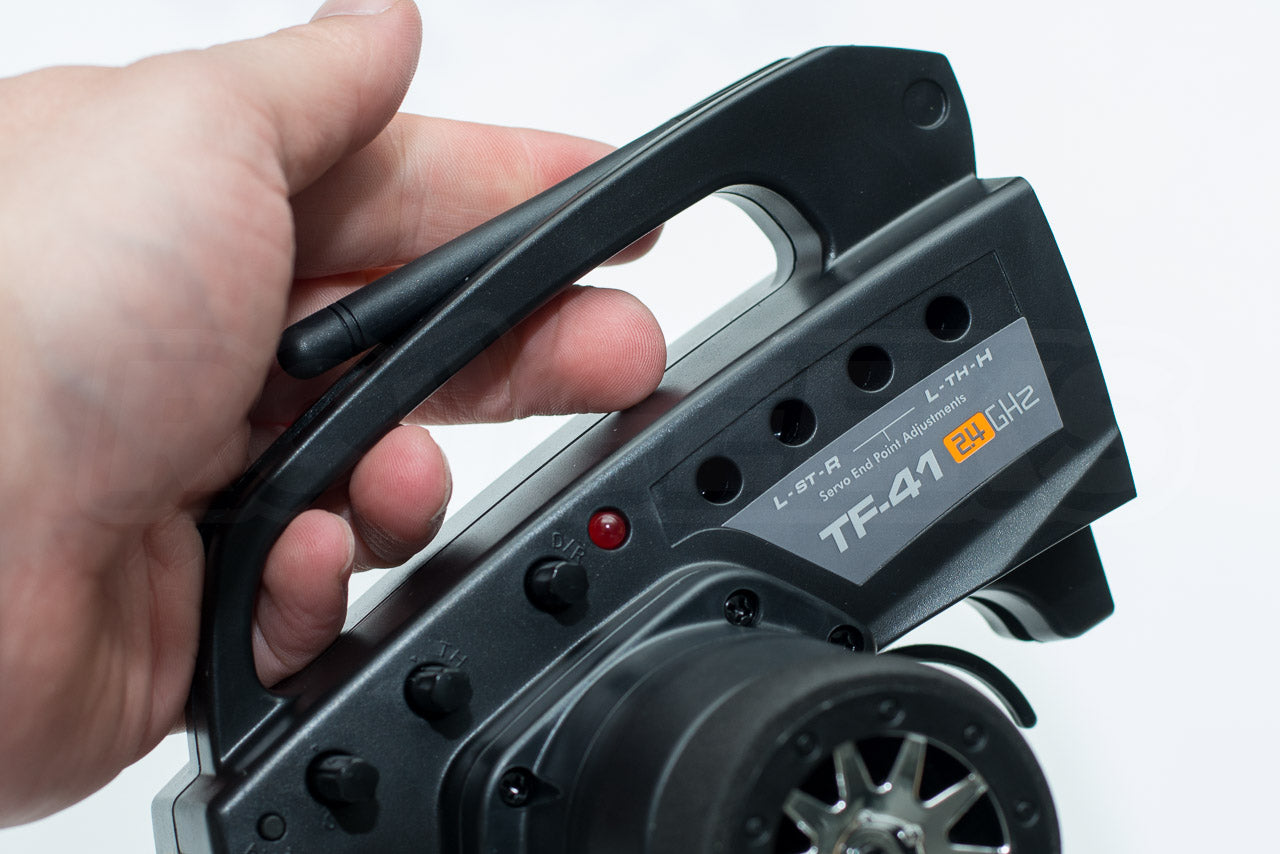 |
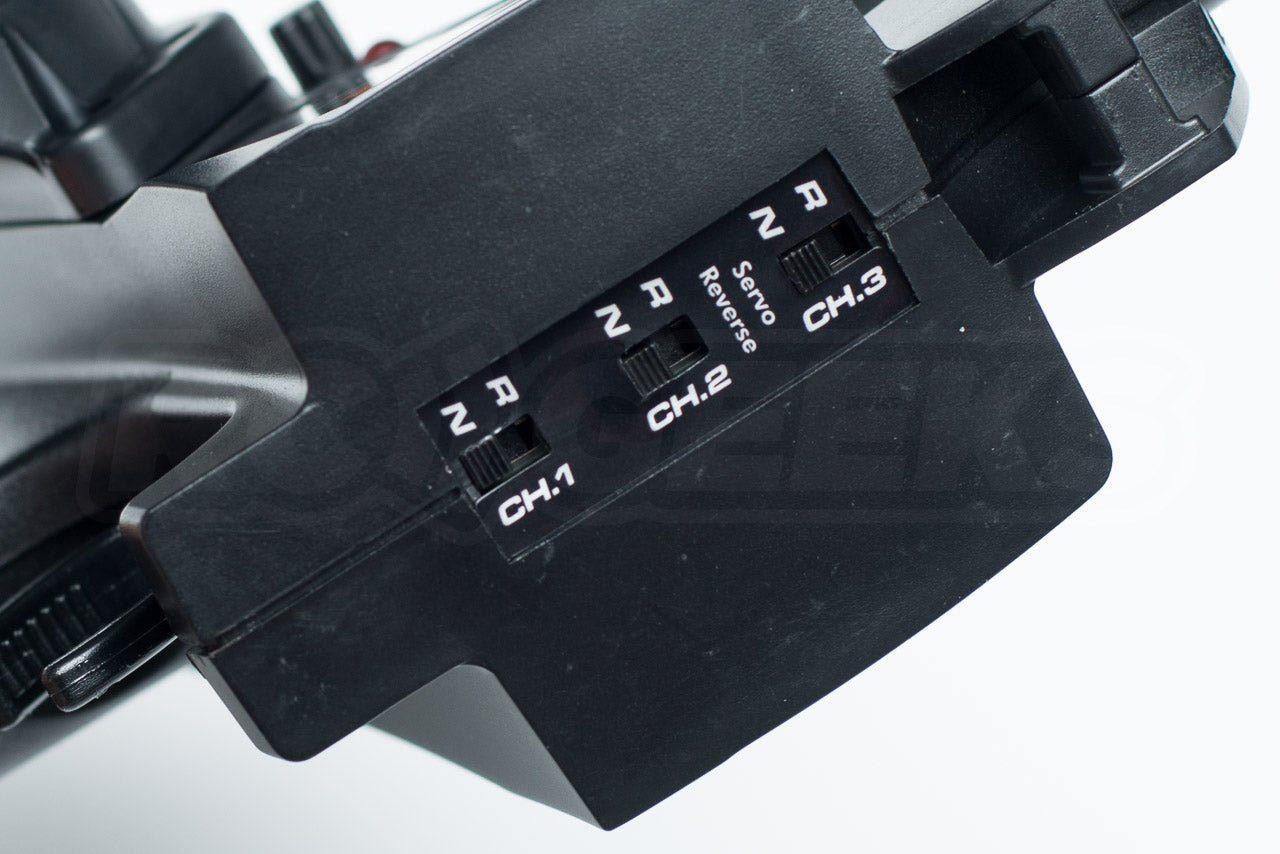 |
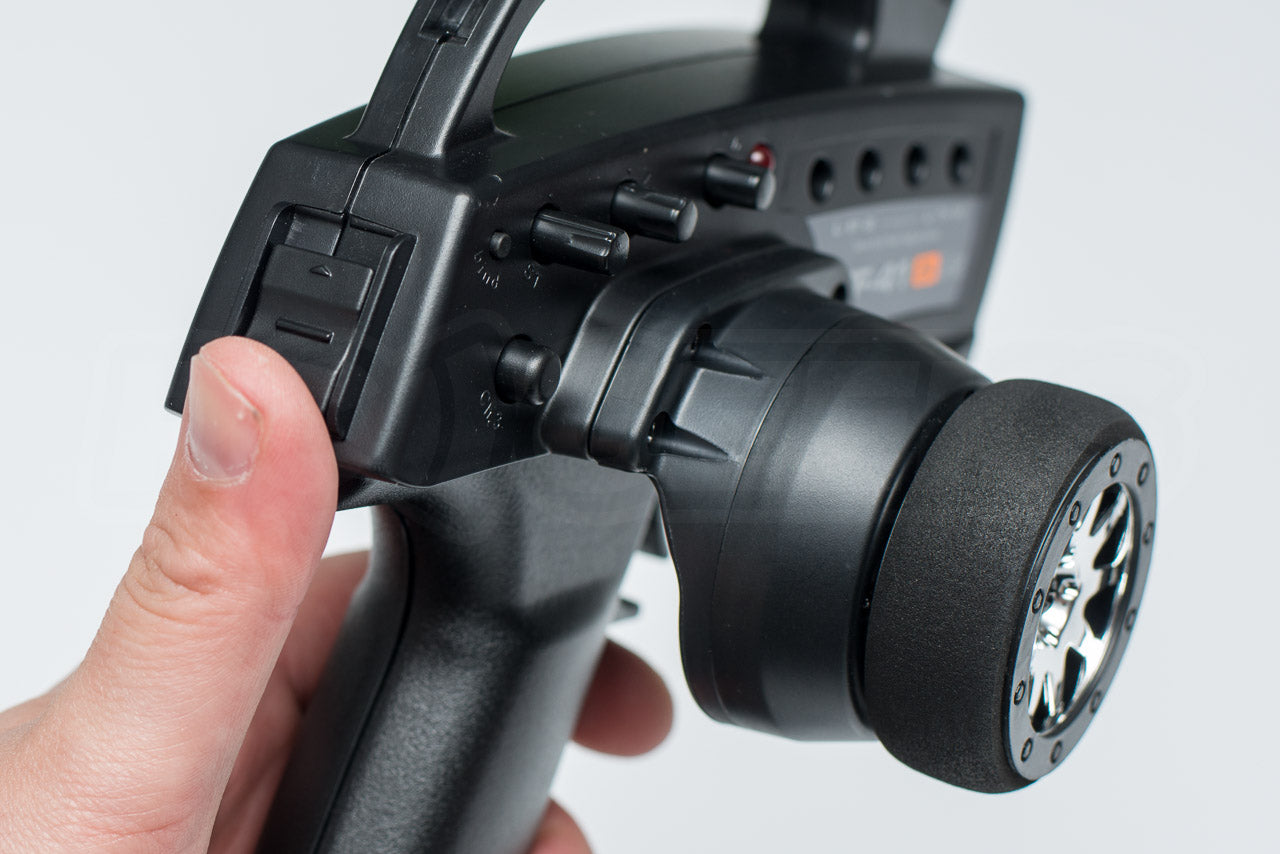 |
 |
On the chassis is the other half of the package, the RF-41WP 2.4Ghz receiver, a 4-channel waterproof unit. The antenna cable runs over the propshaft to a plastic tower where it is secured in a vertical tube with rubber tip.
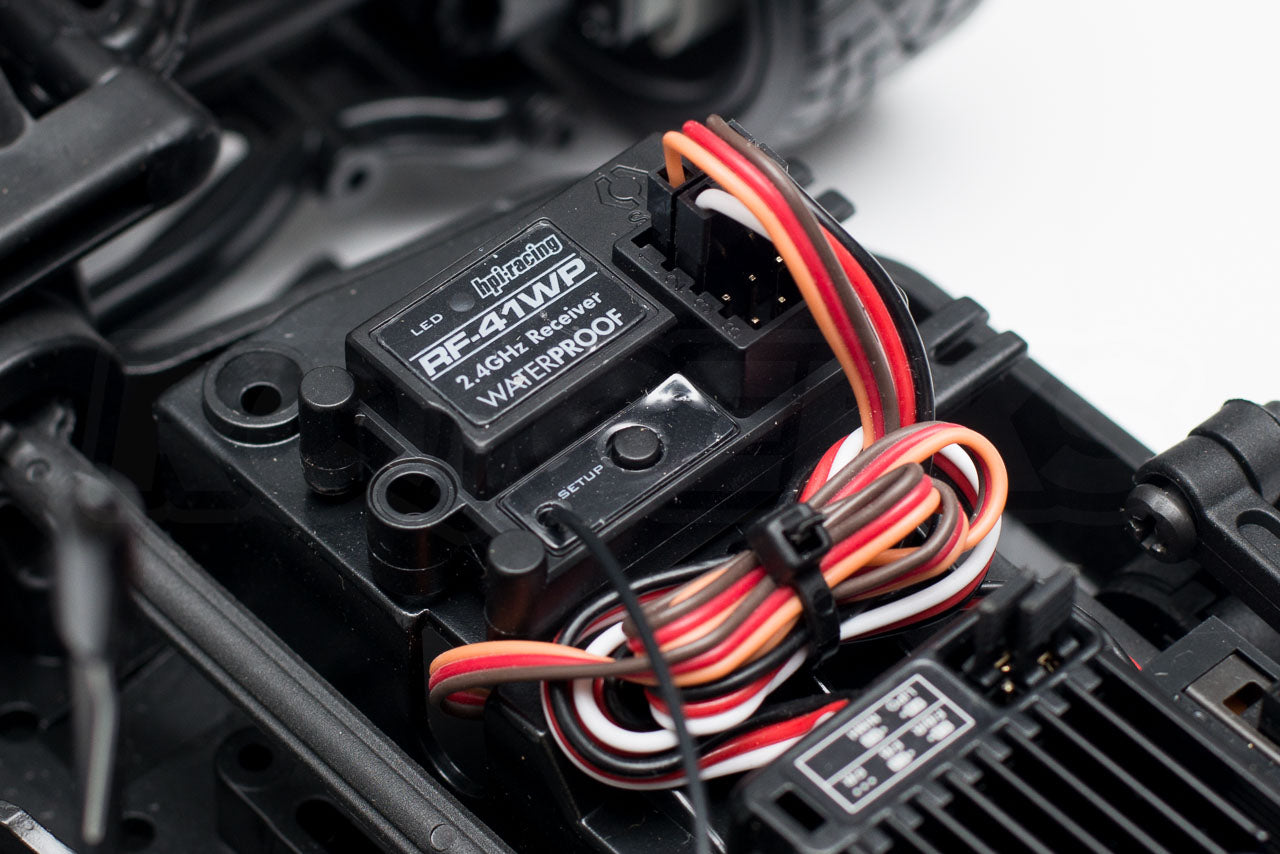
Awesome R34 Skyline drift body
The Nissan R34 body included with the set comes pre-painted and stickered up. It is a scale replica of Arkady Tsaregradtsev's 'Fail Crew' drift series car.
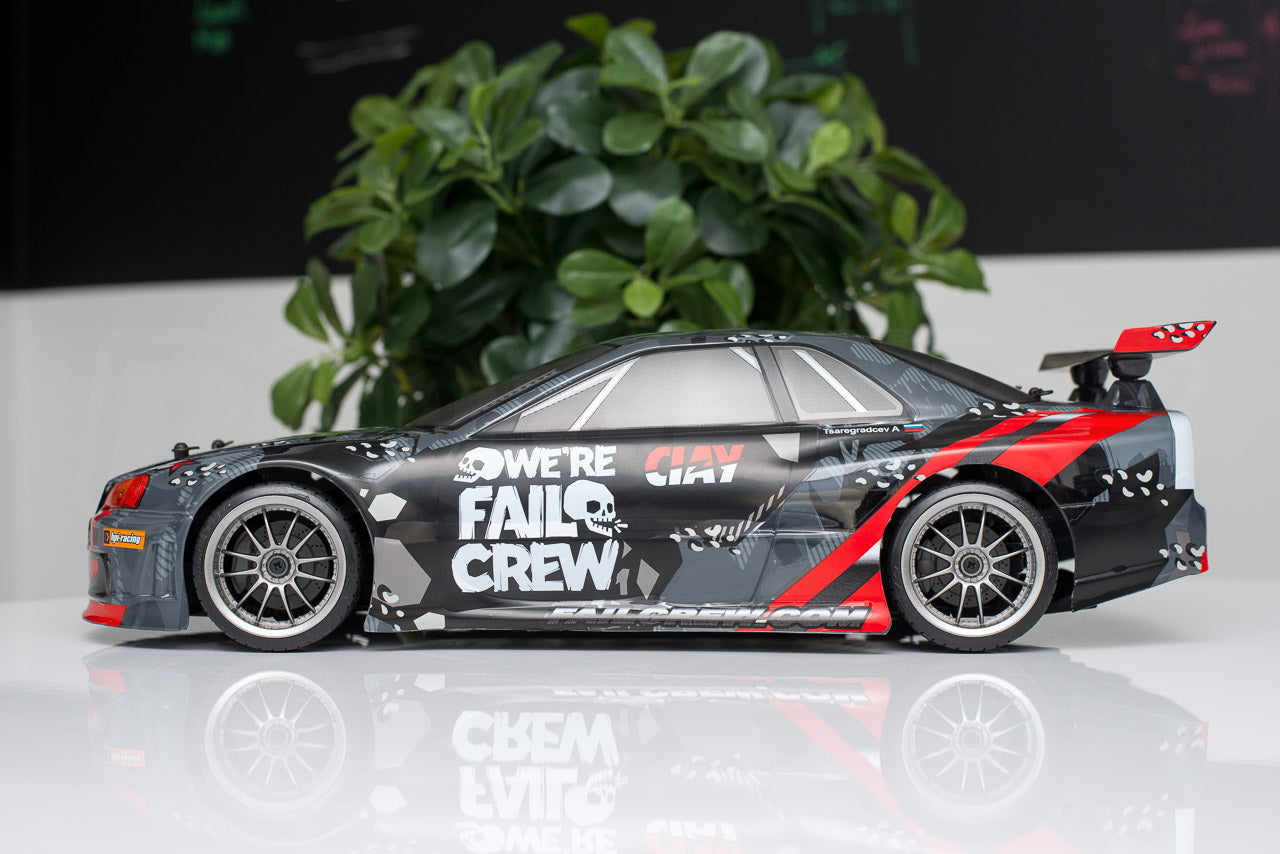
The familiar R34 sillhouette comes across, but when Traxxas are producing intricately detailed bodies adorned with scale accessories, this feels fairly basic. Backed with grey paint, the body's windows are opaque and there are no light buckets.
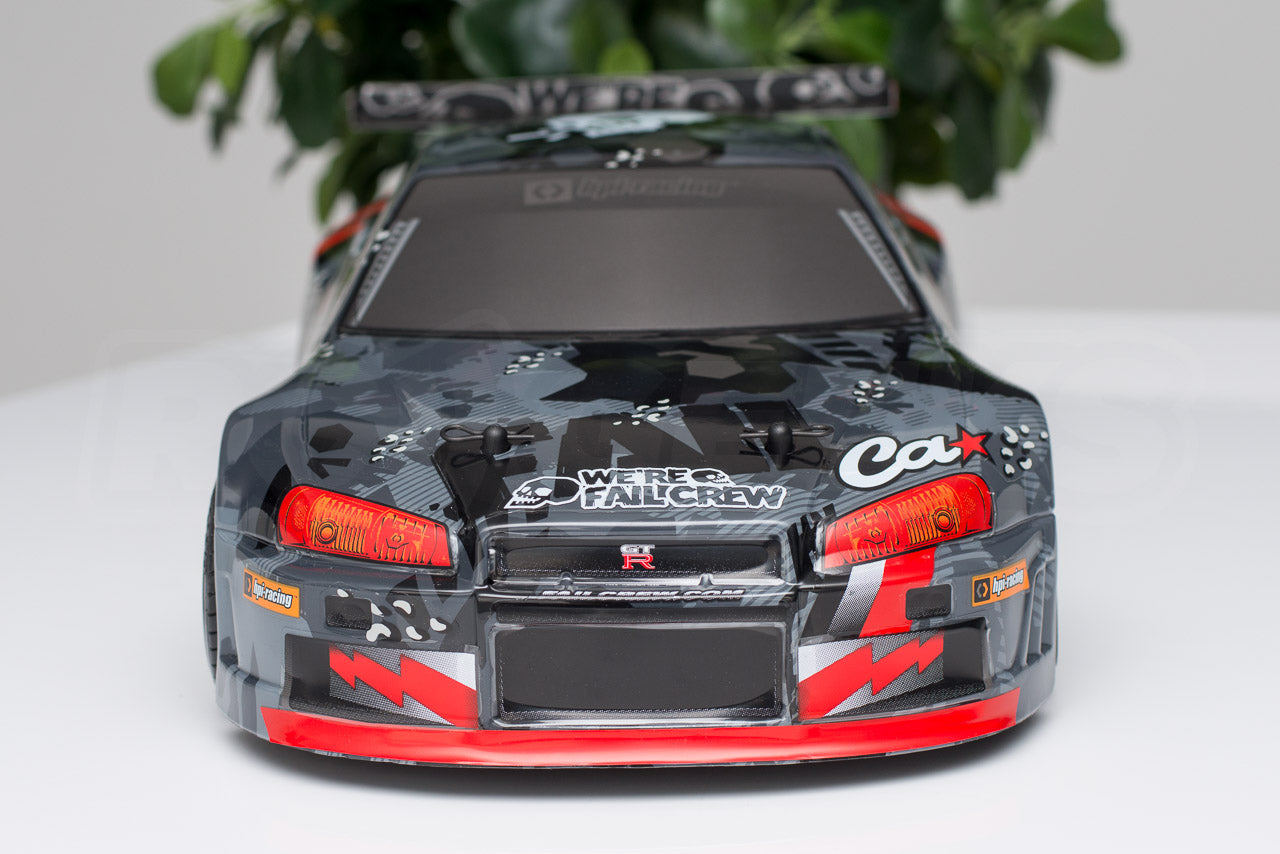
|
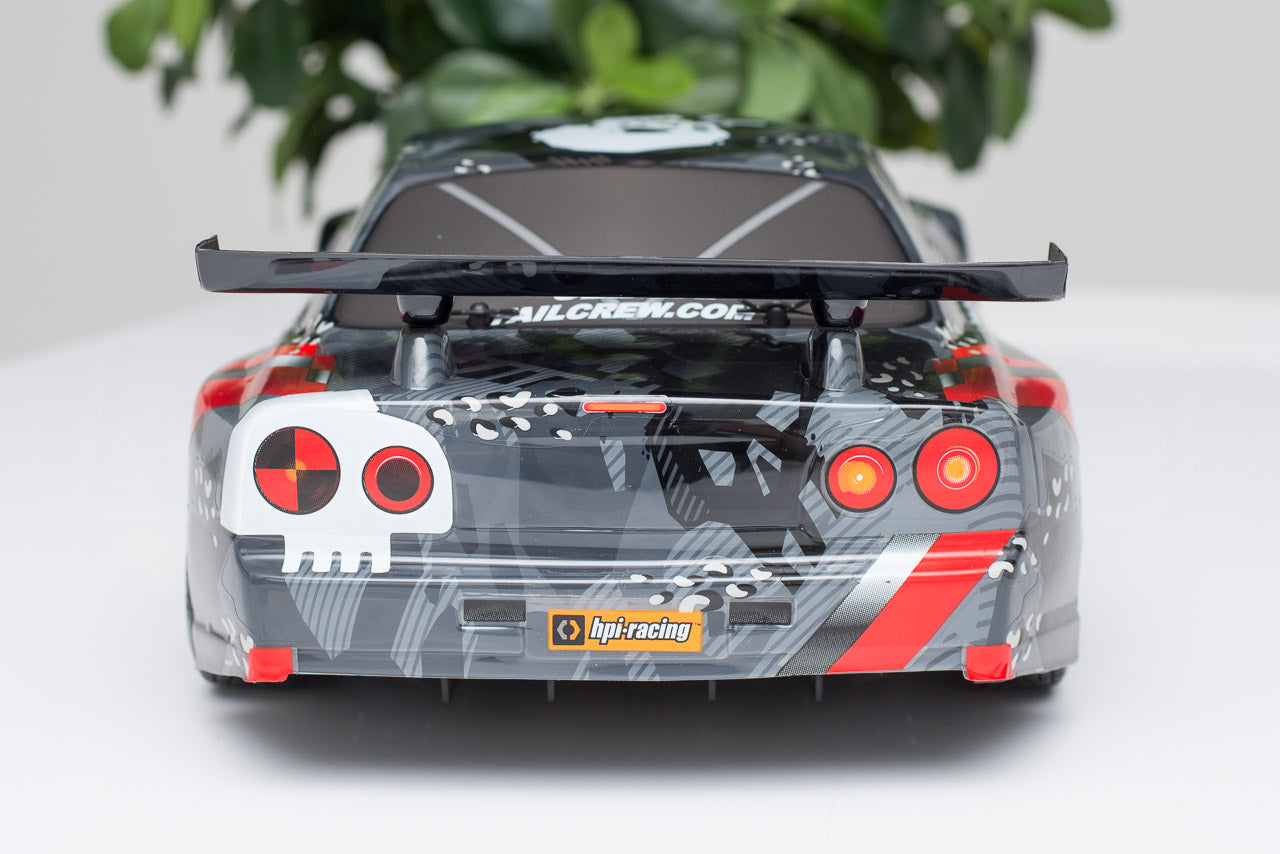 |
Beyond the wide arches and large rear spoiler, the detail work is carried by extensive sticker usage across the shell. We do like the mix grey camo broken up with skulls and red highlights.
 |
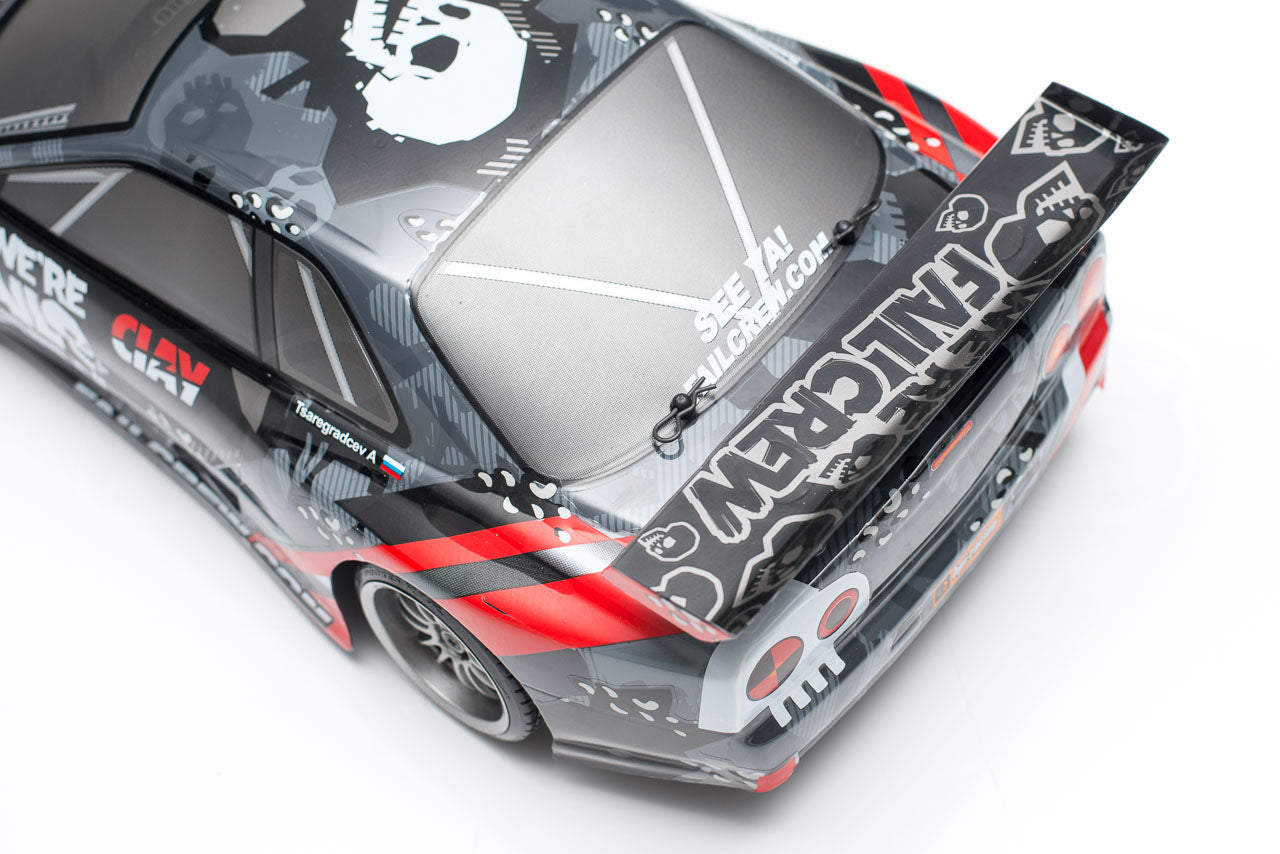
|
If not to your tastes, the chassis will accept most 200mm bodies sold on our web store.
Indoor Drifting
So how does it drive? At the time of the review the UK is being battered by storms and whilst we have been lucky to avoid any serious flooding in our area it has put a damper on our RC use. When HPI offered us a drift car that we could slide inside, we jumped at the opportunity.
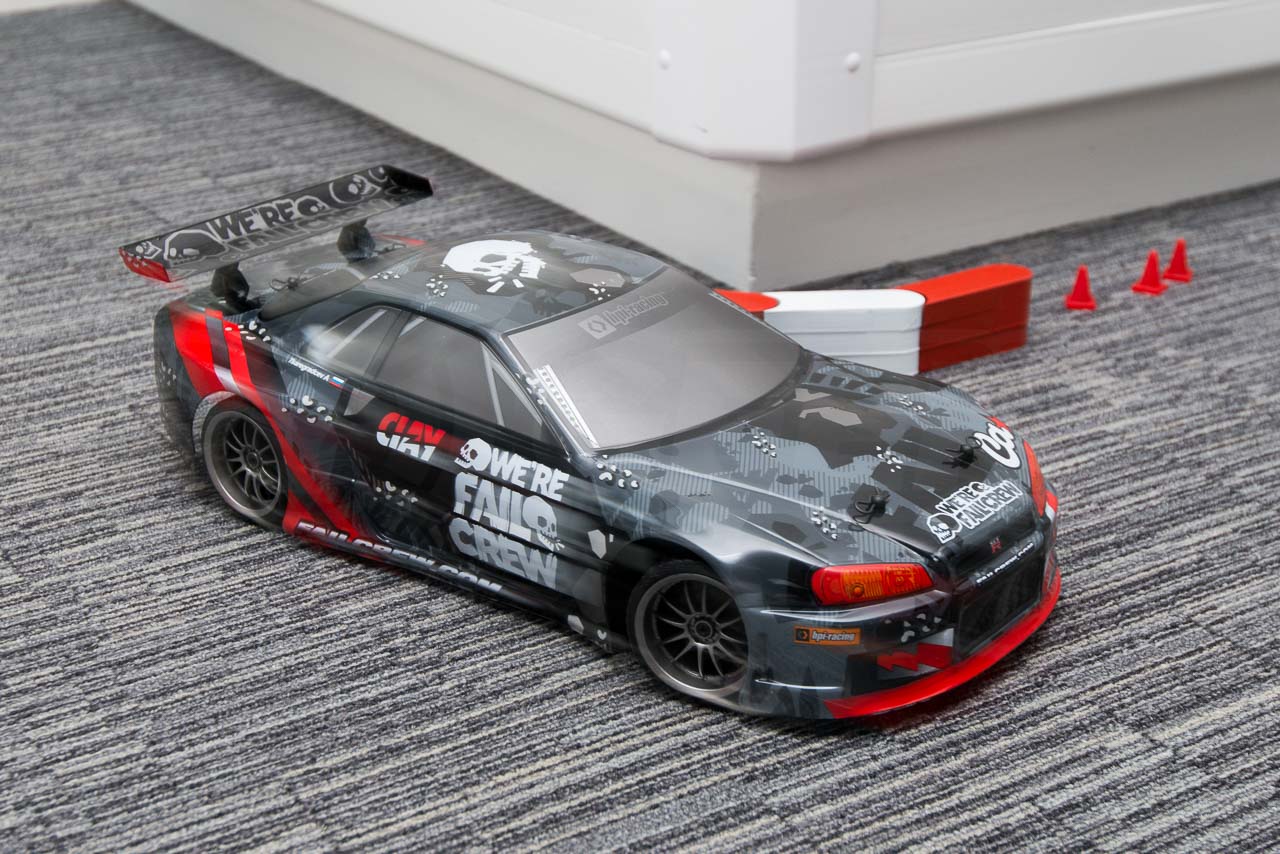
The E10, quoted as 1/10th scale measures 375mm long which is about as large as you'd want to drive indoors. Our office carpet has a short dense pile which makes for an ideal drifting surface, it has for enough friction to allow some turn in, whilst allowing it to slide with a small kick to the power.
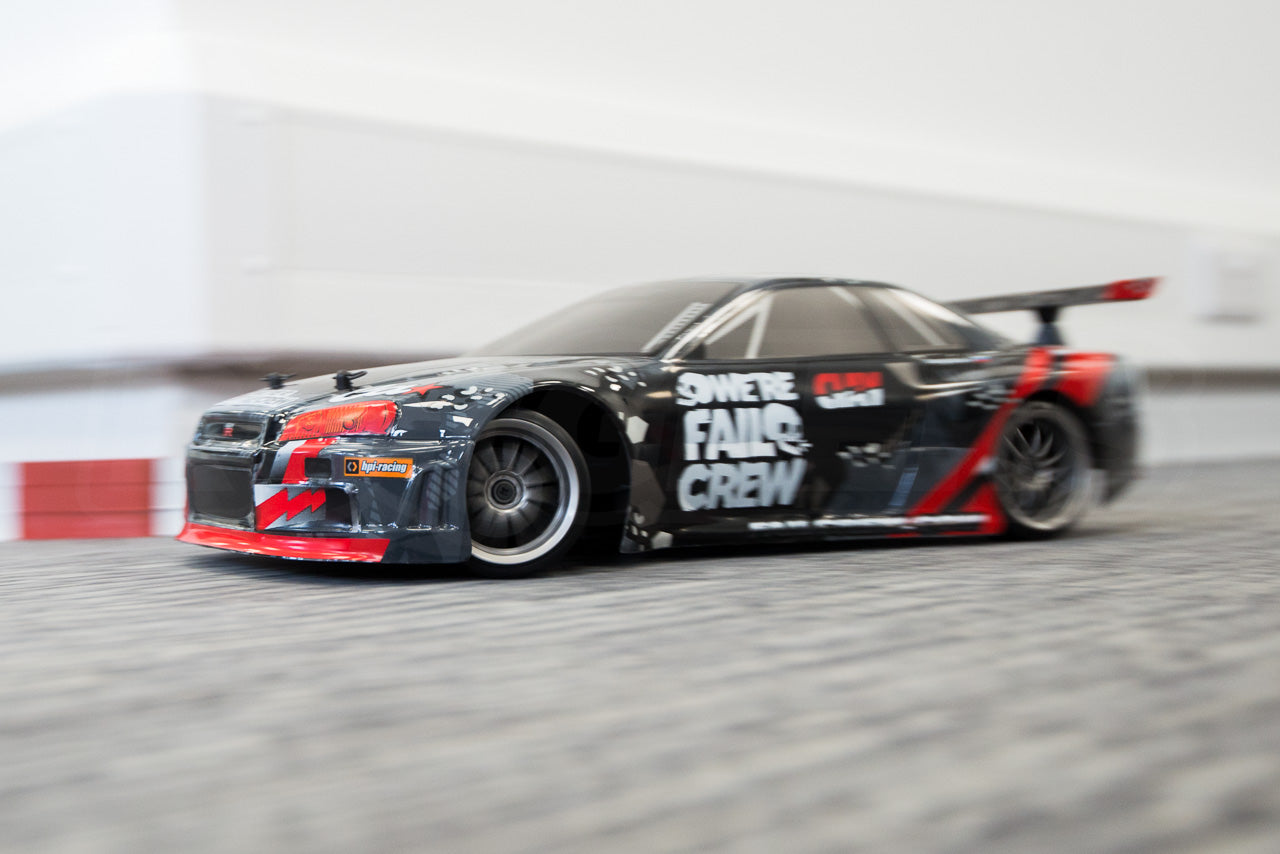
Naturally indoor drifting is performed at a slower pace, dodging furniture and walls. Yet plenty of entertainment can be had in setting up a few clipping points, learning how to balance the car in a sliding turn.
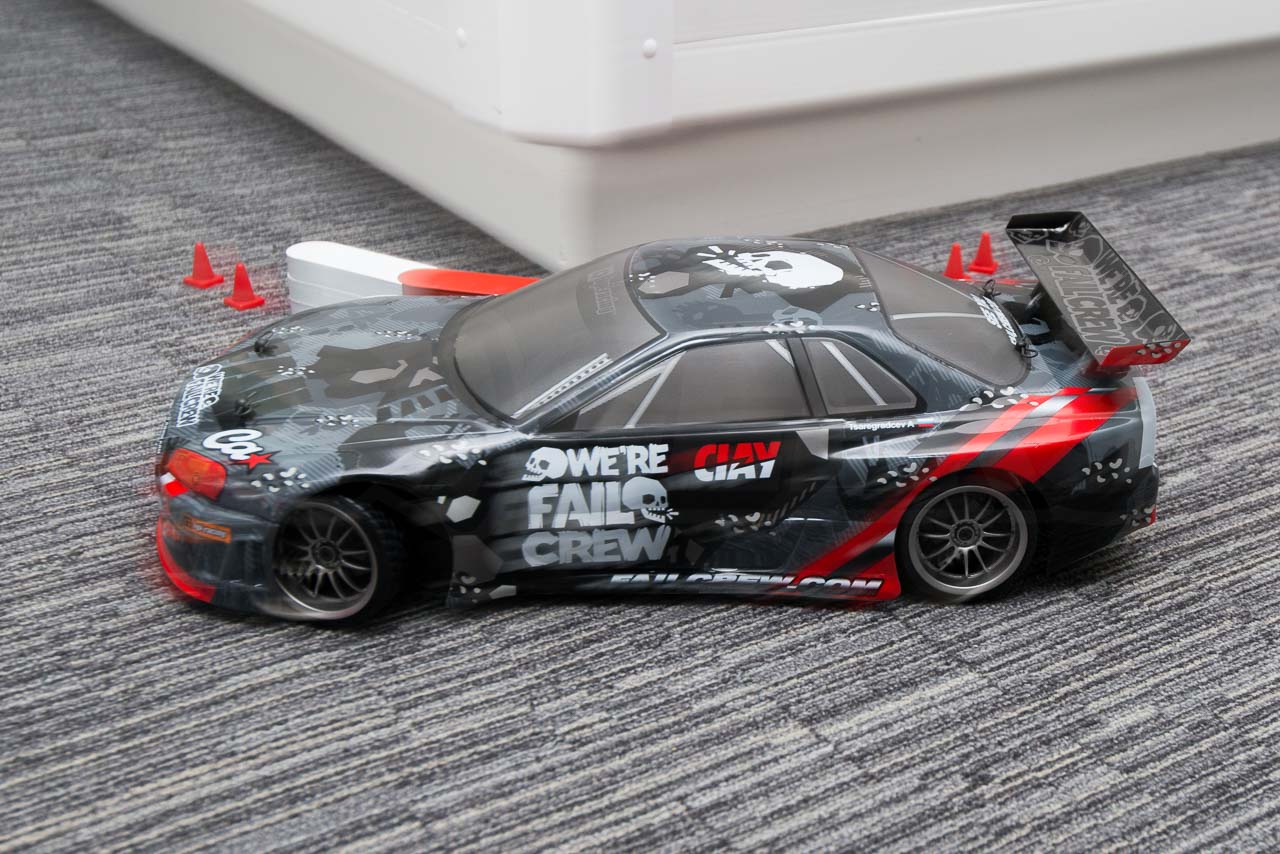
|
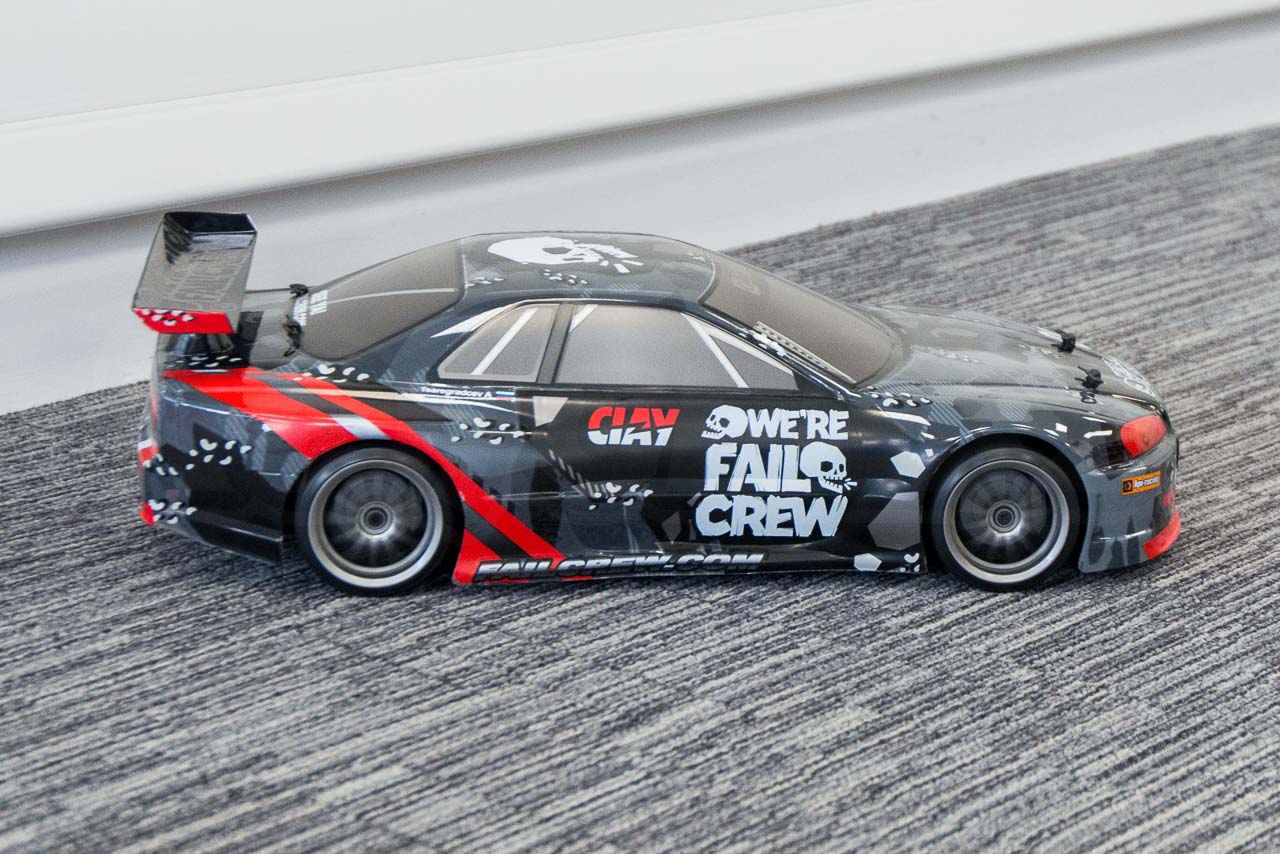 |
In fact, if this is your first drift car, getting acquainted with the car's handling on carpet is a great idea. Chucking the car into a turn on weight transfer then the powering and counter-steering your way into a turn can be practised whatever the weather.
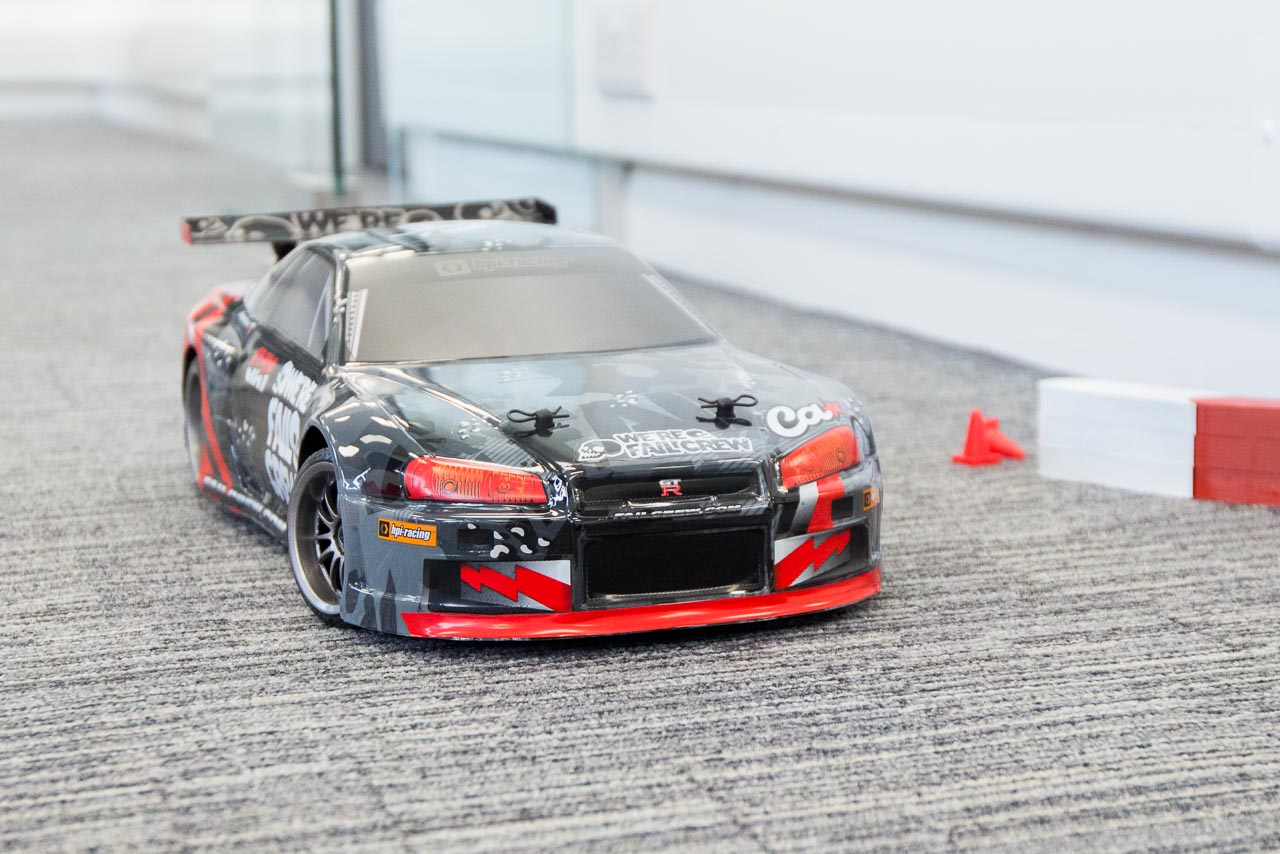
Only the size and mass of the model restrict the entertainment, requiring a reasonably large area to practice weight transfer shifts and power slides with full throttle.
Outdoor drifting
With the weather improving, there are more opportunities to drift outside, which is likely a more common use case for most of our customers. We advise finding the freshest, smoothest patch of asphalt you can for the best experience.
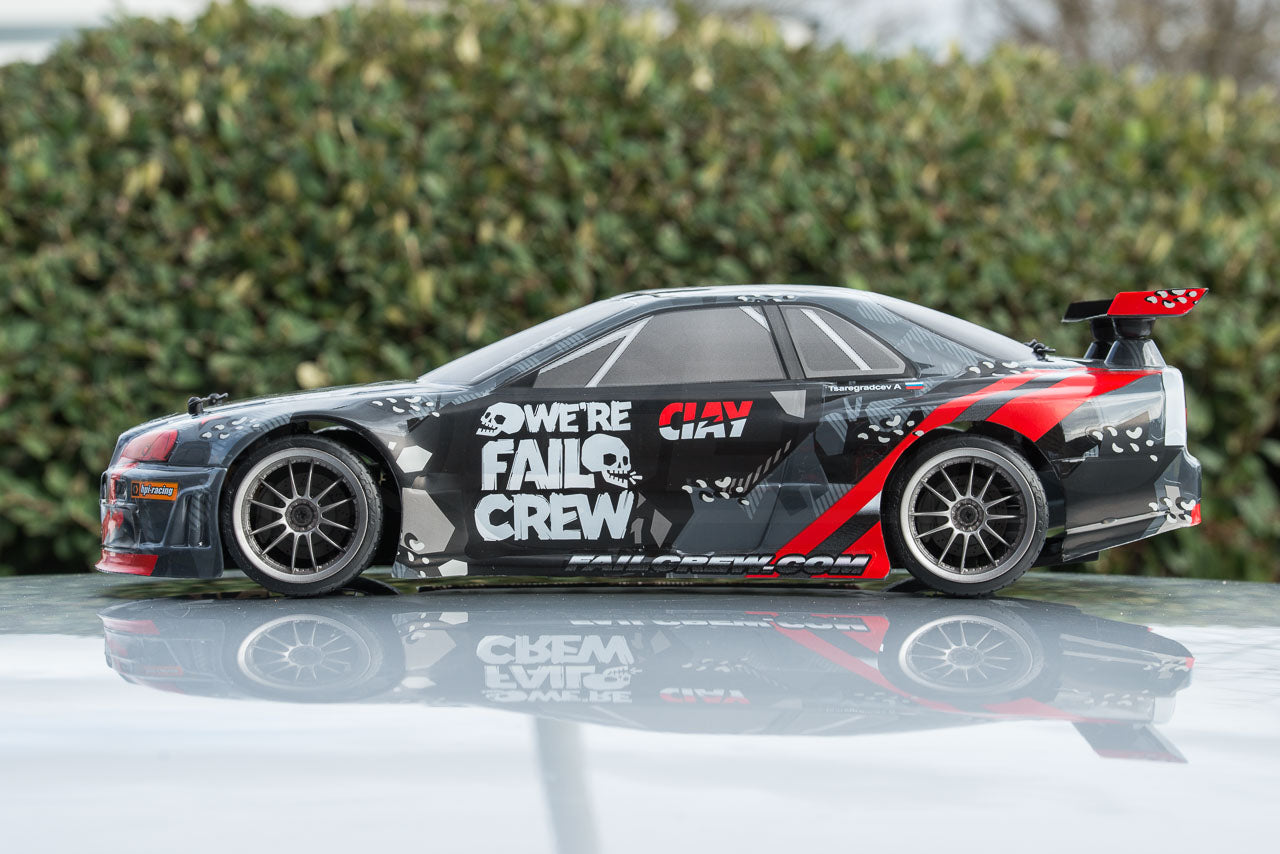
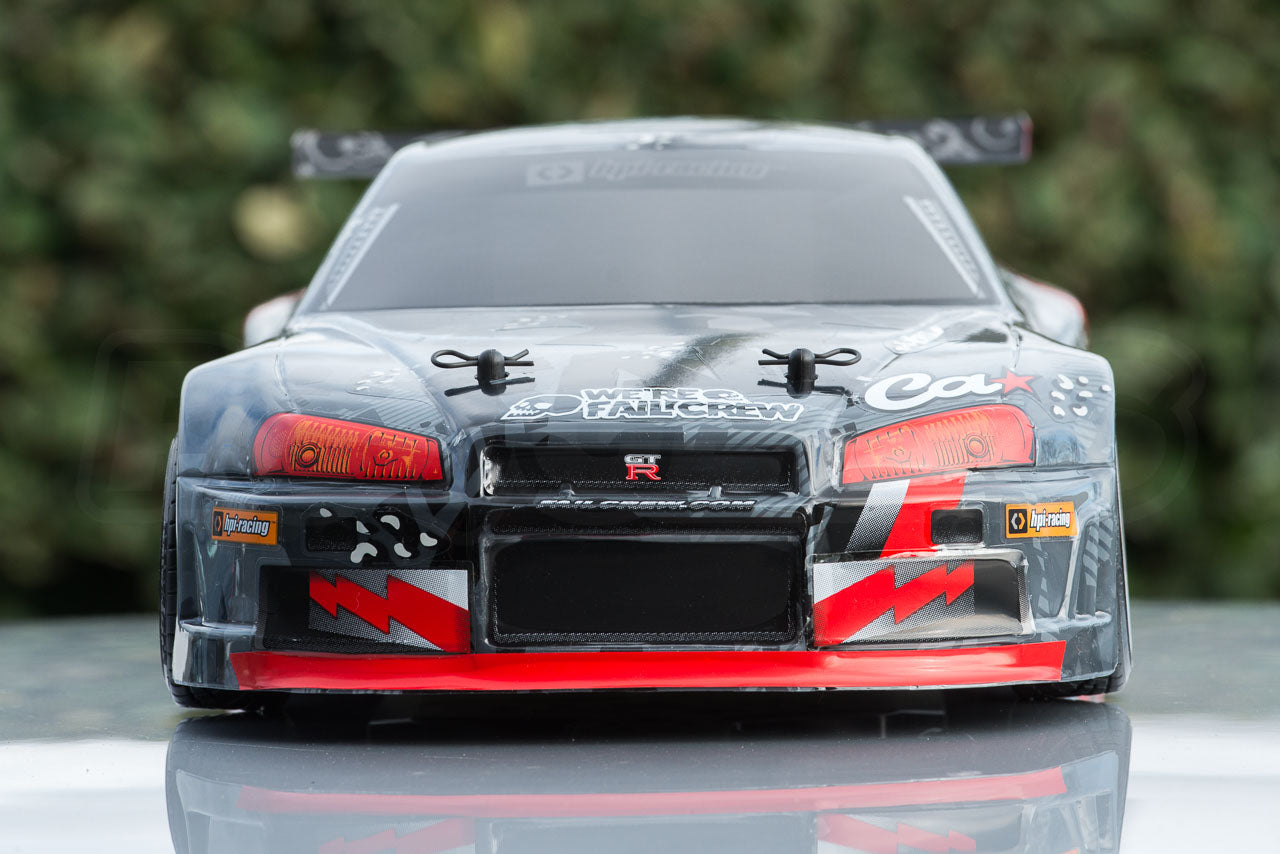 |
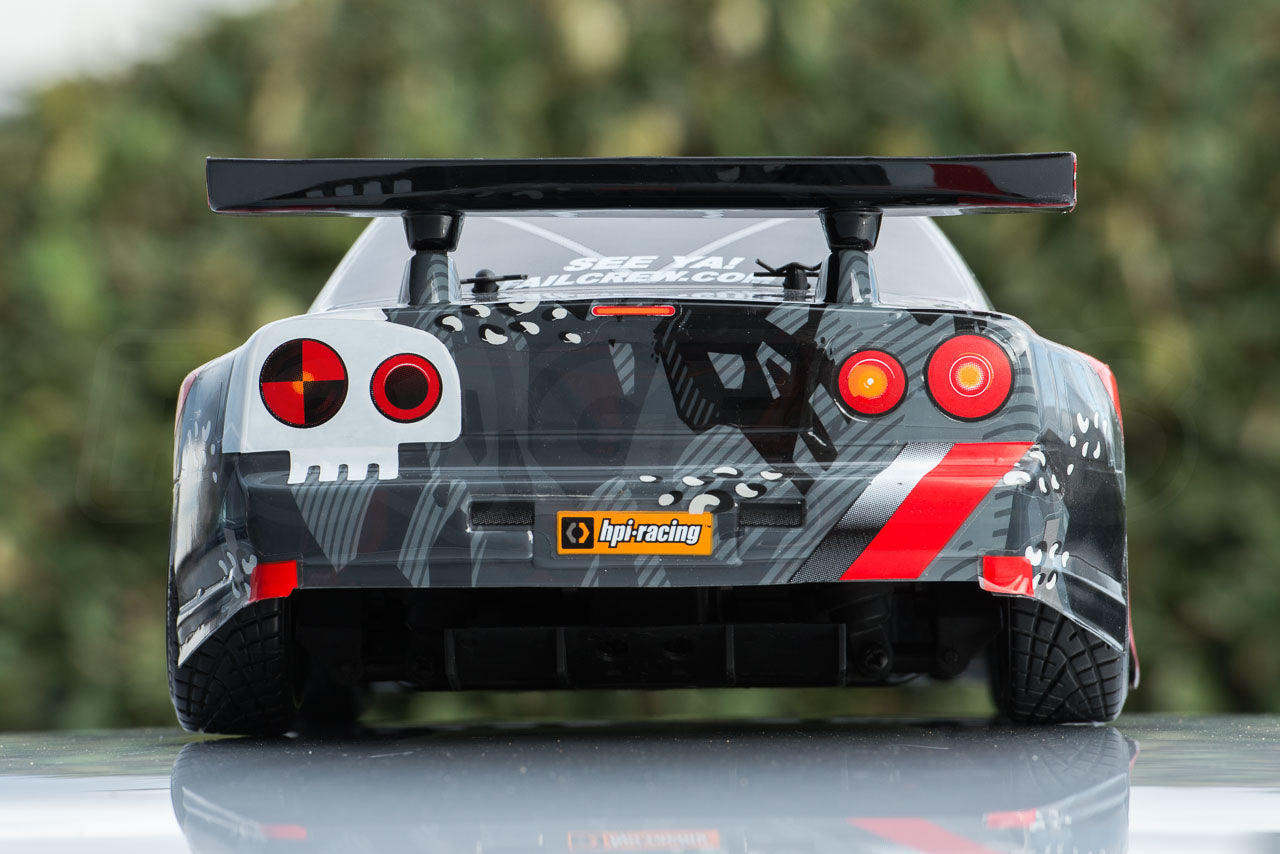 |
Sliding the car on a rougher higher-grip surface will require you to use a lot more power to initiate your drifts. It will also result in the car sometimes 'catching' mid slide, gripping the surface and whipping round to follow the countersteer-ed wheels.
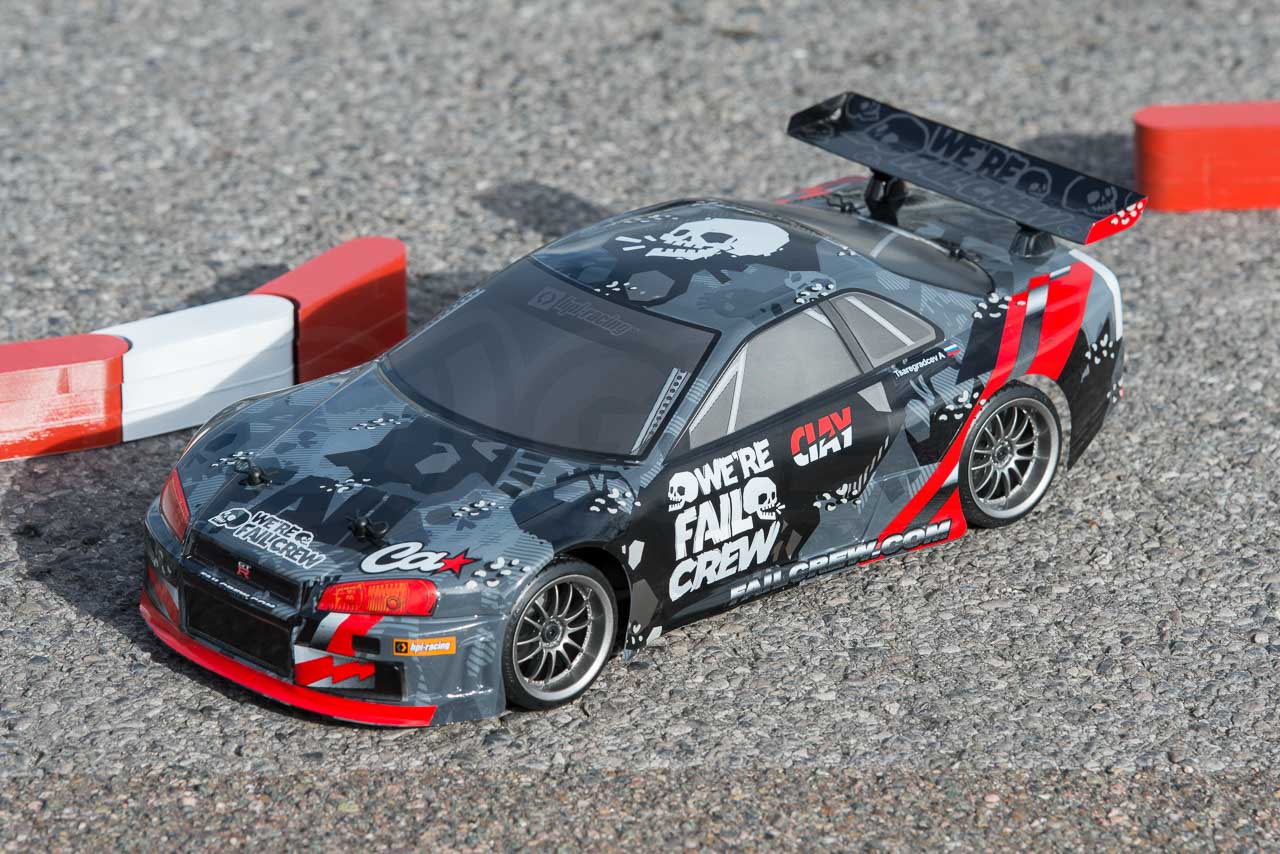
The rough track also trashes the tread detail on those hard plastic drift tyres, their performance mildly deteriorating alongside the aesthetic. Never fear as spares are available from our webstore as seen alongside this article.
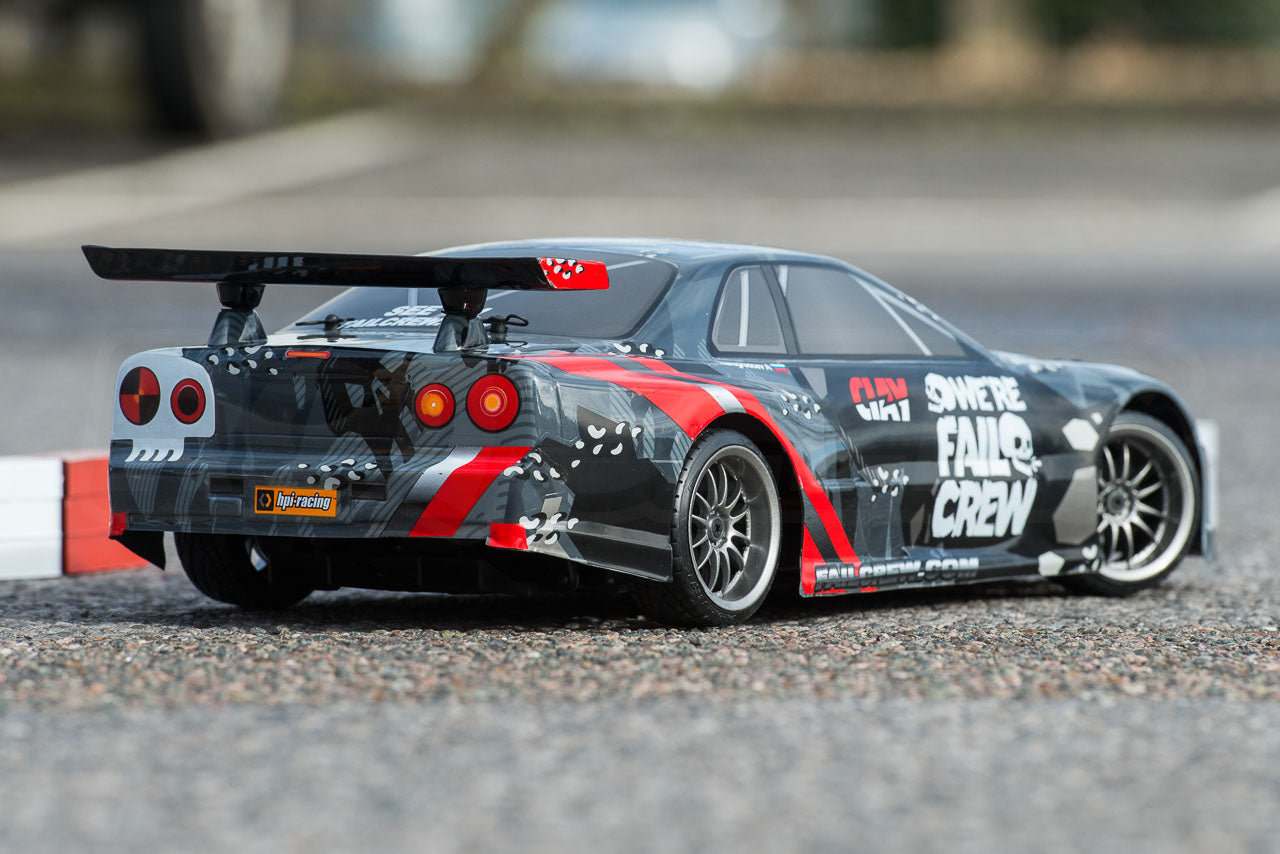
Larger spaces will, however, allow you to get a better feel for balancing the car in a sustained slide on just the throttle.

We advise setting up some small barriers or cones and practicing sliding around in an oval, moving to a figure eight for catching the slides, before graduating to balanced transitions along an 's' bend layout.
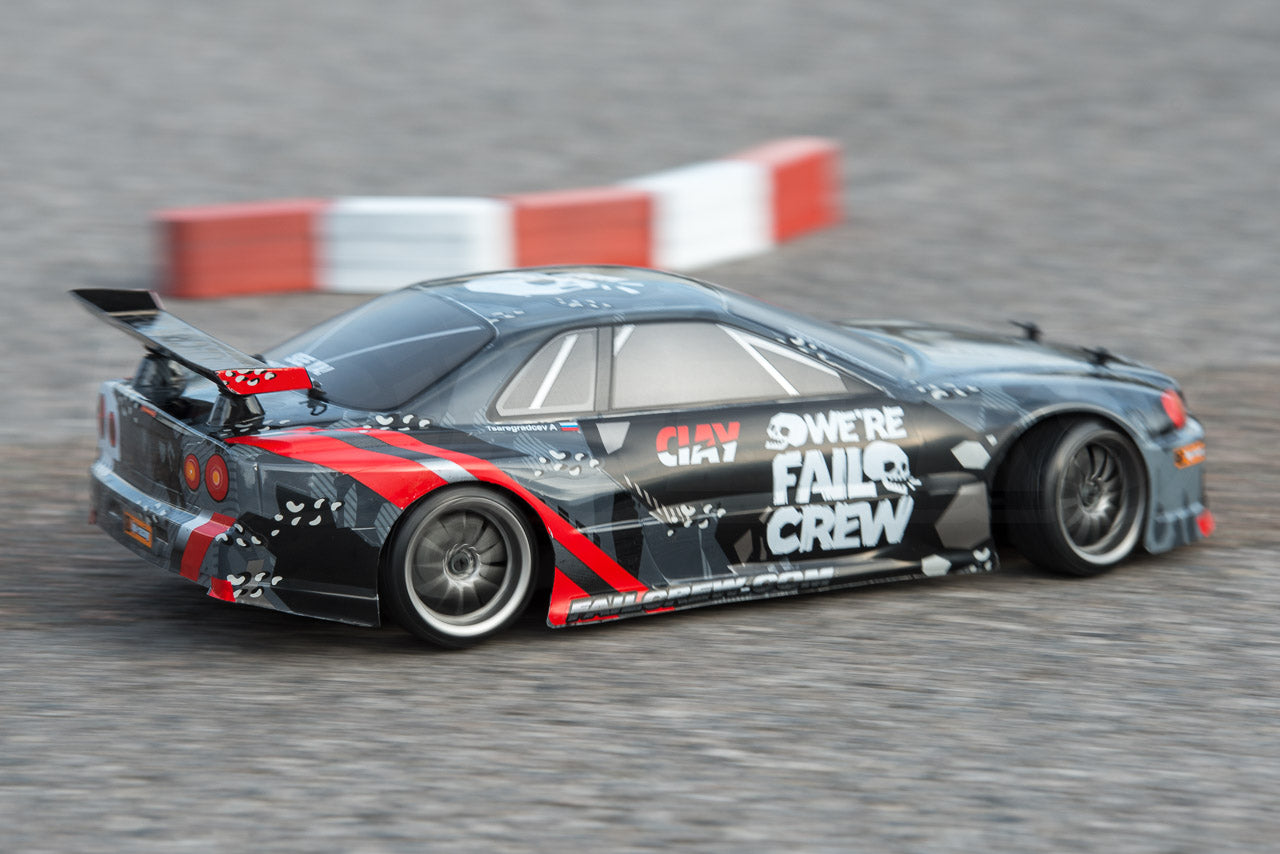
This is where the real enjoyment of drifting can be found, repeatedly challenging yourself to take a corner with more angle, or at a higher speed whilst grazing a clipping point. For this, the E10's reliable performance means it scores highly.
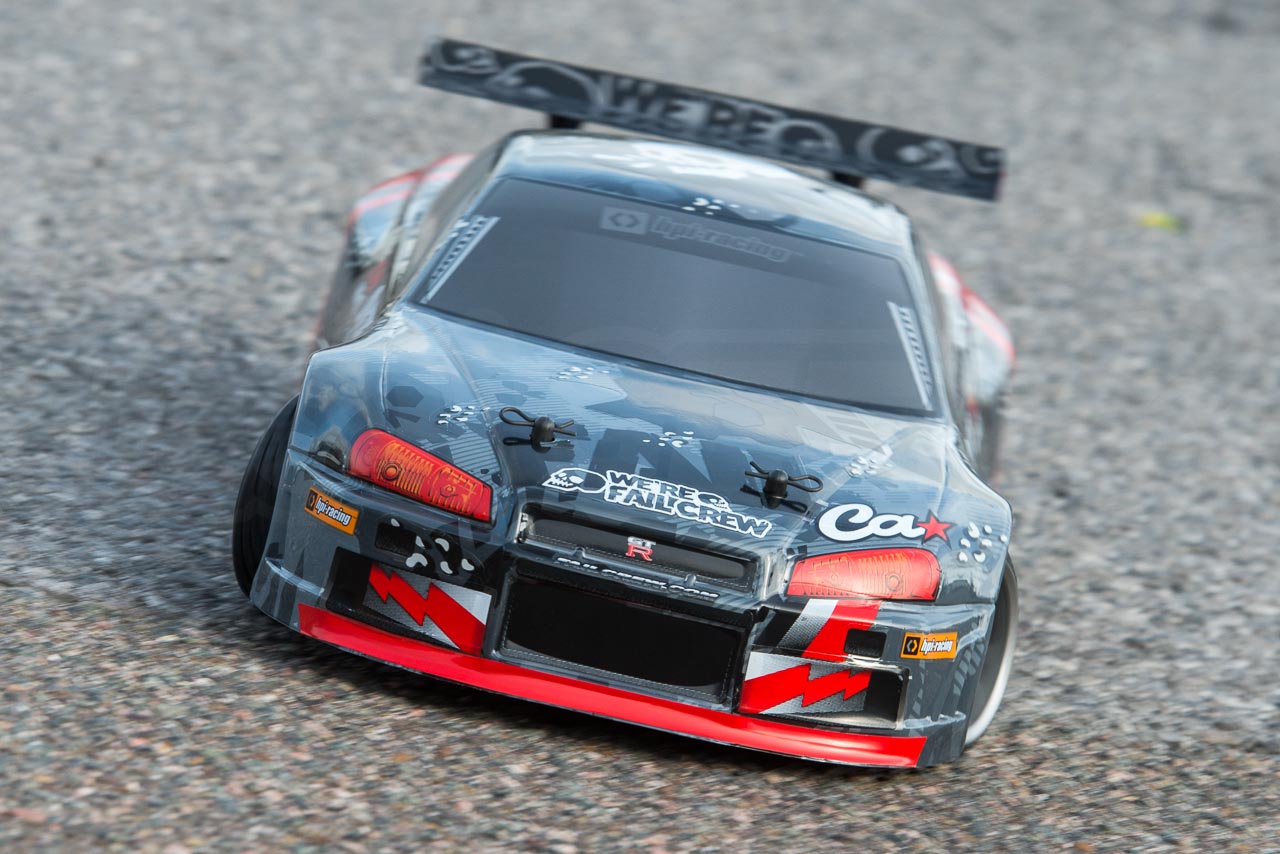 |
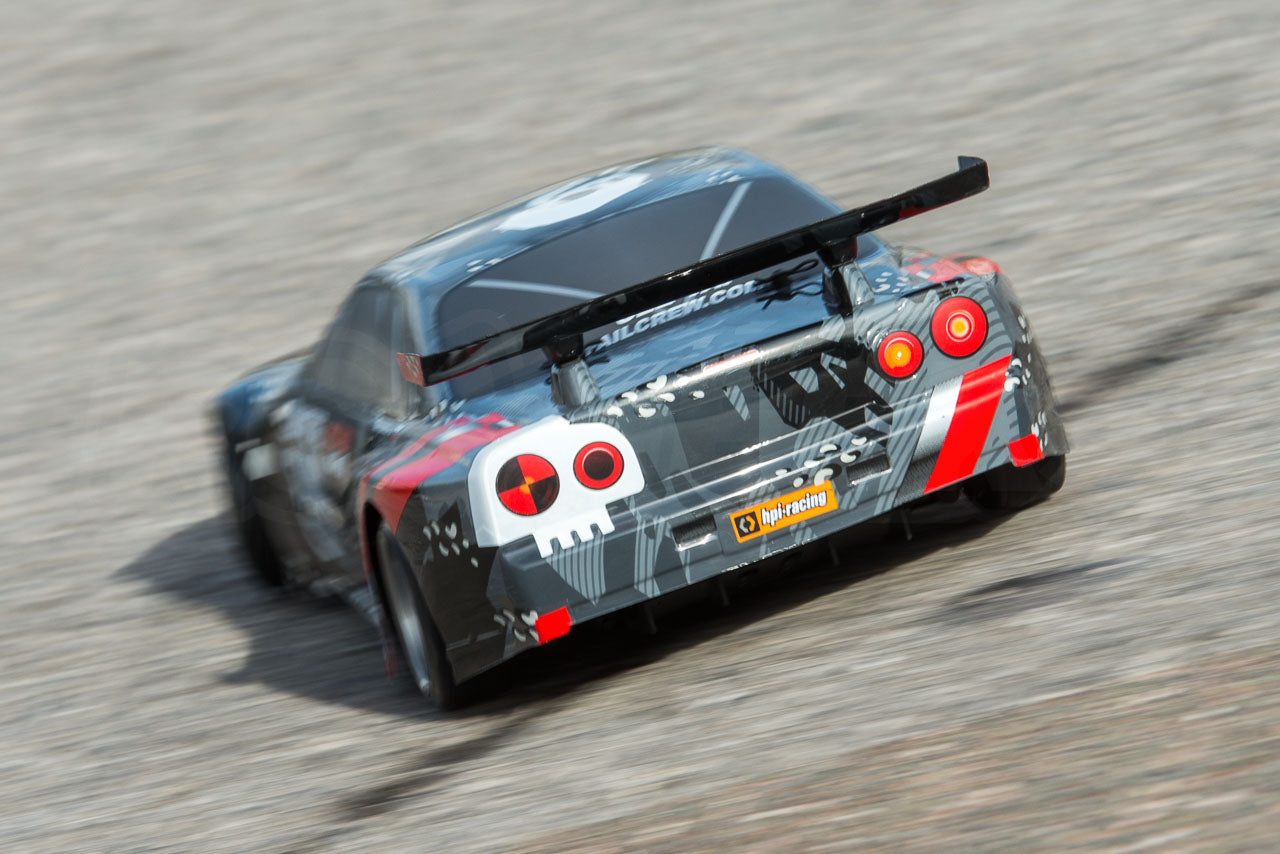 |
The bundled battery gave a good 15-18 minutes of run-time but this very much depends on the style of driving you are doing. Typically, drifting is all about feathering the throttle, thus the 2000mAh battery lasting longer here than in a dirt buggy. Eitherway you will want to buy at least one more battery to keep yourself sliding for longer.
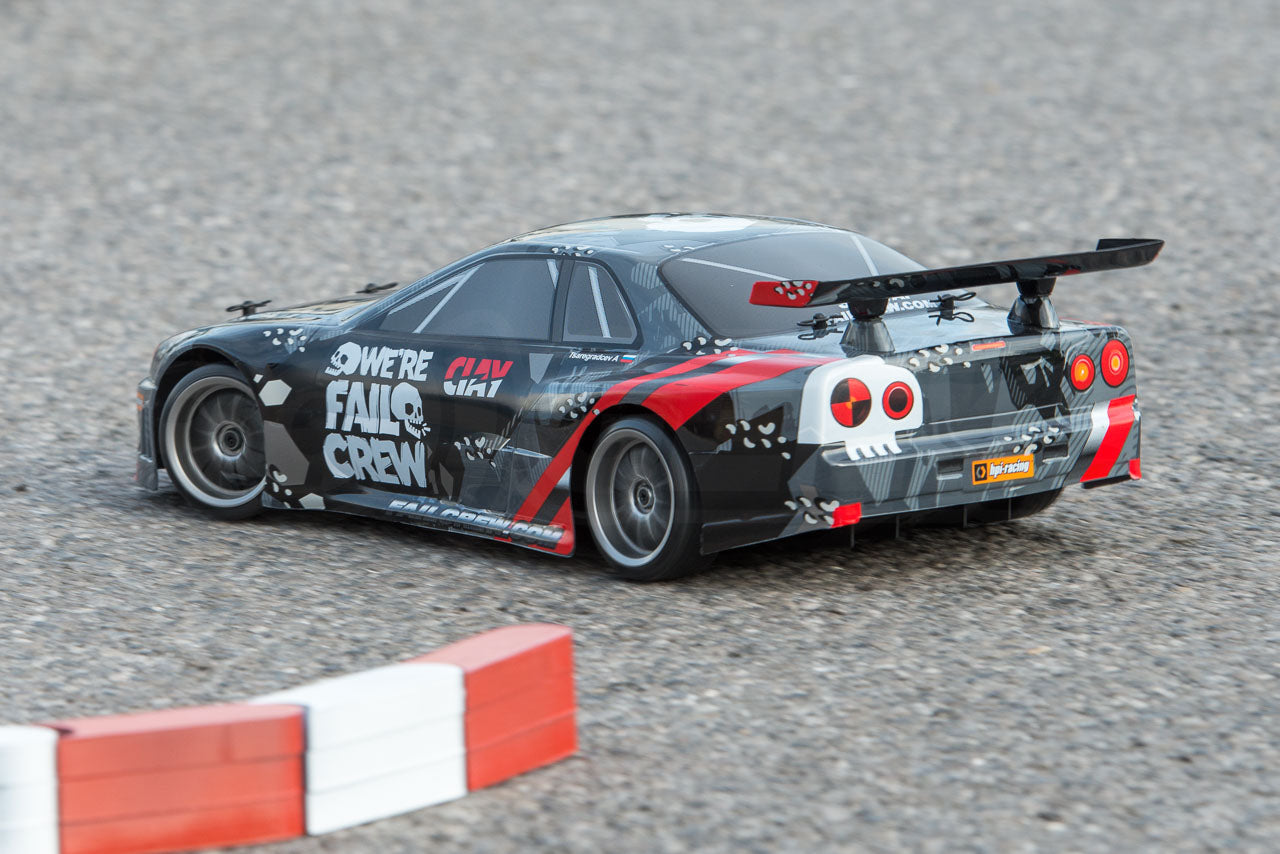
The bundled transmitter did the job well, with more than enough range for the distances you are likely to operate the 1/10th scale chassis from. Whilst ugly, the foam ringed steering wheel was comfortable in use, the only improvement that we'd really like to see is the option to run a 70/30 throttle/brake balance, giving more detailed control over the throttle.
Who is the E10 for?
HPI Racing's E10 is fantastic for anyone new to RC Cars. Including everything, it allows you to get drifting right out of the box. Beginners will be less concerned with maximum steering angle or shock adjustments, instead concentrating on learning the basics of drifting. For that, this is a perfect and crucially affordable set.
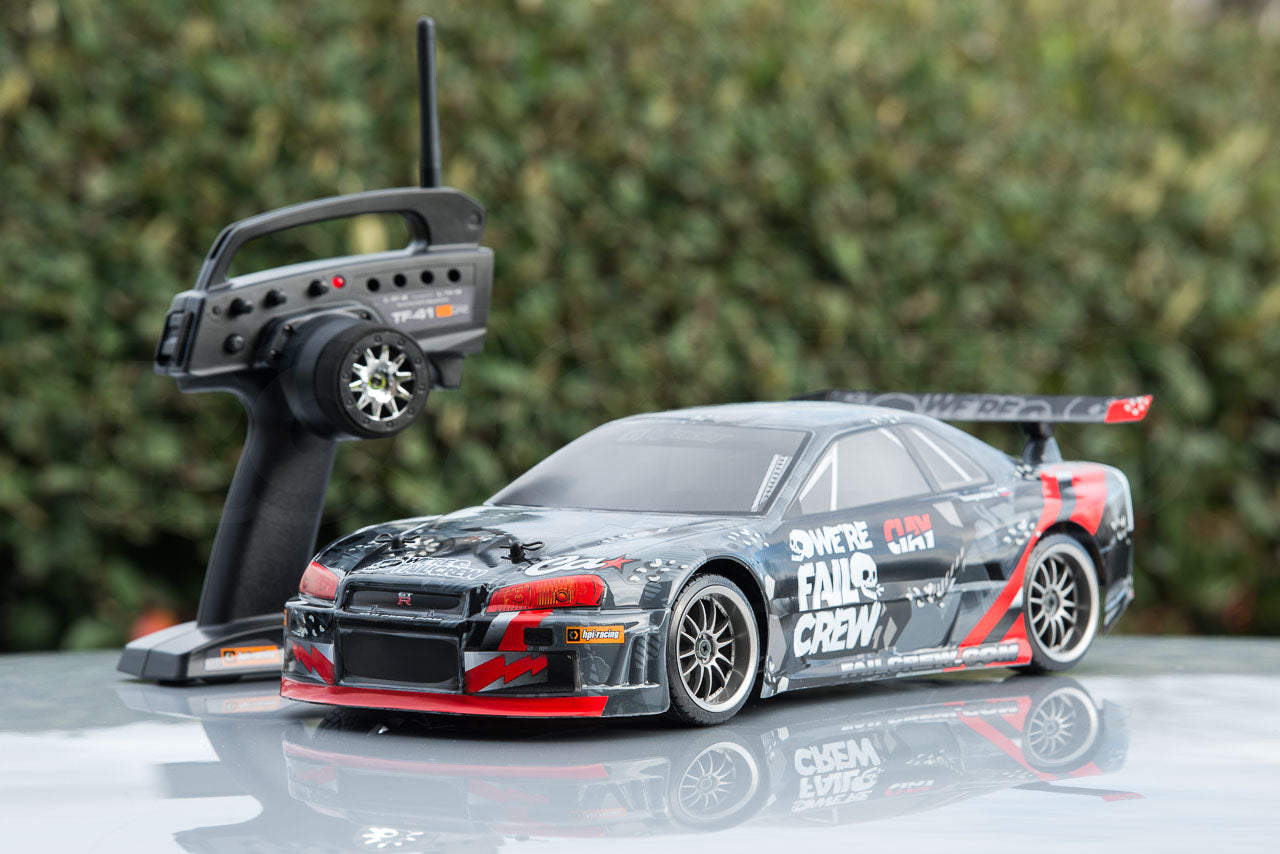
If you are an experienced RC car builder who likes to upgrade and tune your chassis, the E10's effective 'adjustment ceiling' may leave you frustrated. We would suggest self-building a kit such as those from MST or 3Racing.
What are the alternatives?
The gold standard of adjustable chassis (well in our opinion) are 3Racing's Sakura D4 Drift kits. These are for experienced builders only as they will require expertise to source and fit the electronics, however, the level of adjustability and hop-ups is pretty much endless.
Prefer a cheaper model? Take a look at Kyosho's Fazer T1. We reviewed the Supra bodied model and whilst it lacks some of the refinements of the E10 chassis, it is still an entertaining entry-level model.
|
|
 |
 |
 |
If you are looking for something, strictly for indoor use, checkout Kyosho's Mini-Z range of drift chassis. We reviewed the Kyosho Nissan R33 Skyline GT-R in detail late last year and absolutely loved it.
The wildcard on the market is sturmkind's Dr!ft set. Controlled by your smartphone, this drift set is designed for table top usage and has game modes such as Gymkhana.
RC Geeks : Drifting fans
Here are RC Geeks we are big fans of scale drifting. Our webstore is packed with drifting products and we have buying guides and blog articles on the topic.
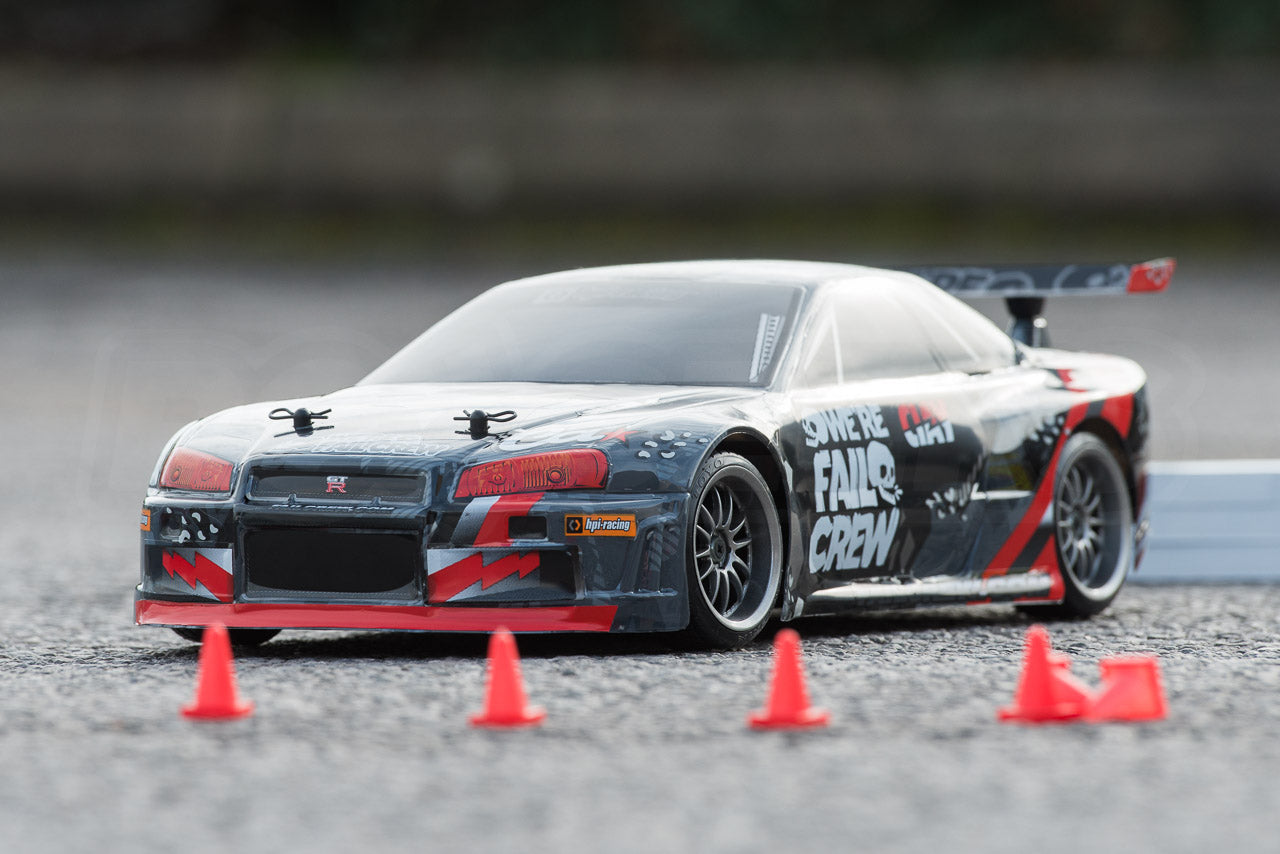
Do you have any questions about the HPI Racing E10, or RC drifting in general? Want us to review a particular drifting product? Leave us a message in the comments section below!






